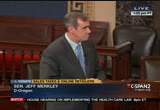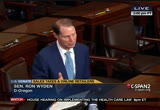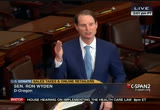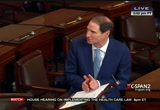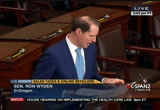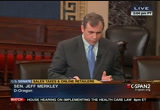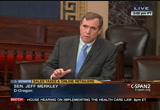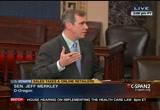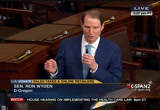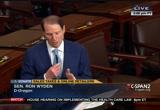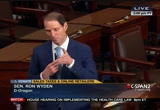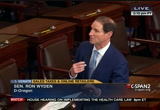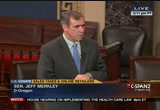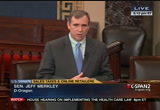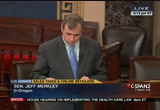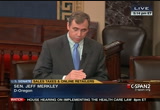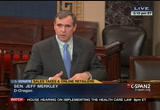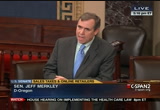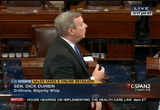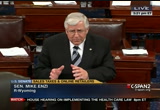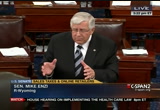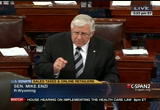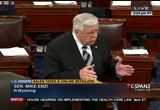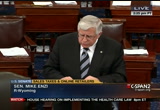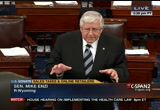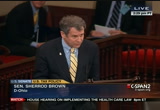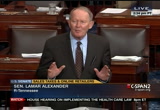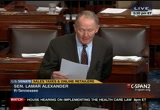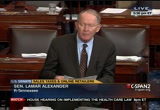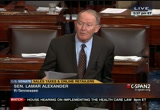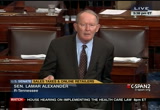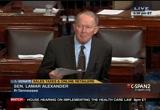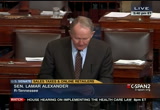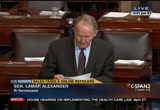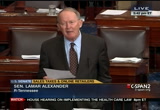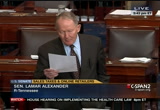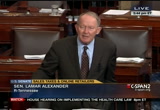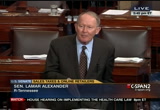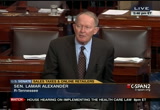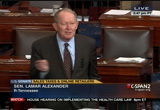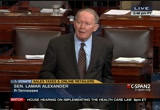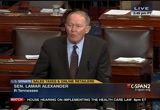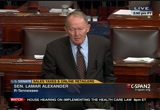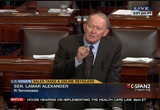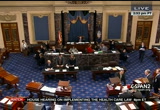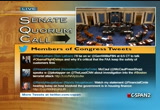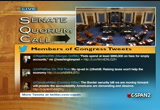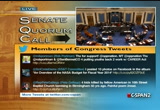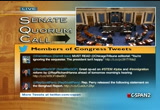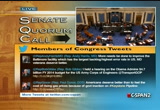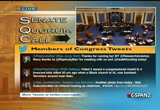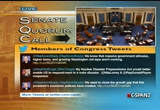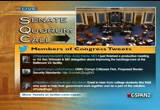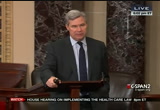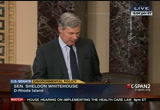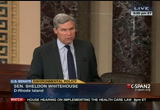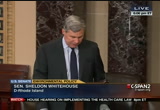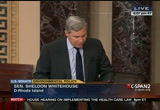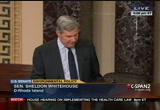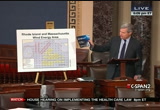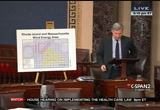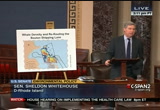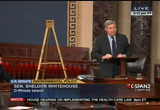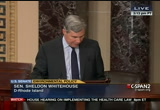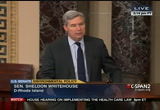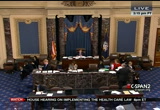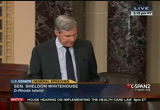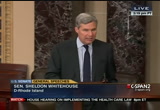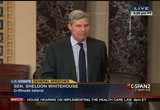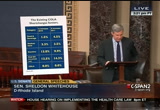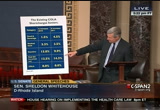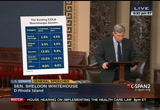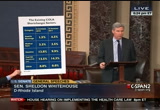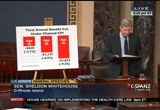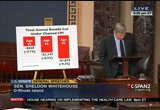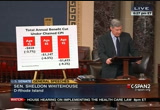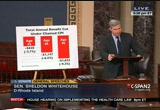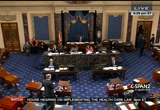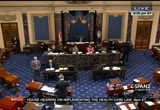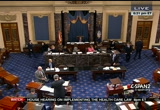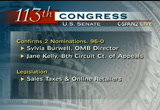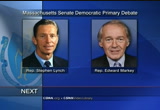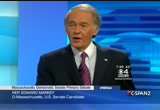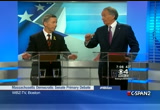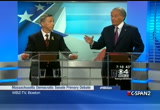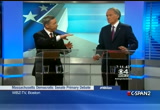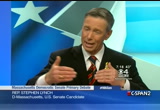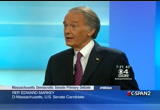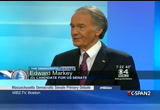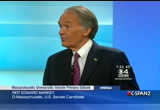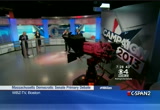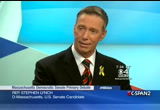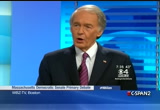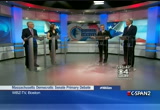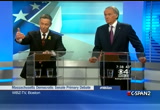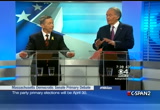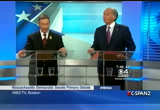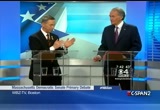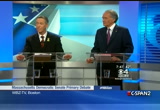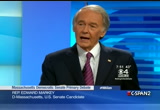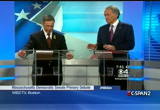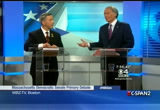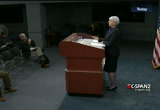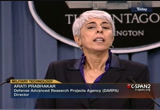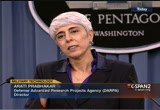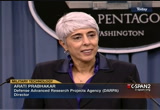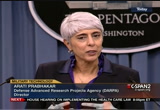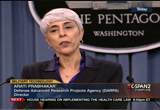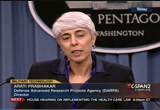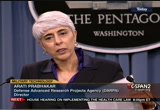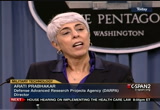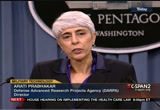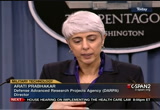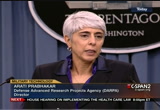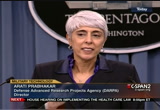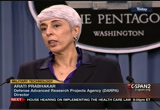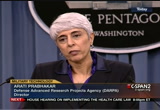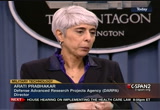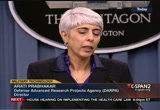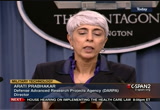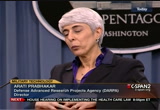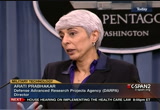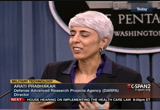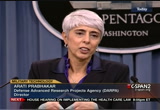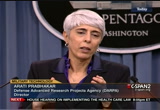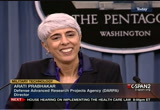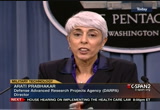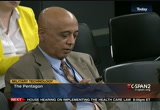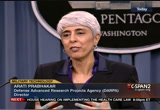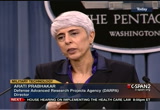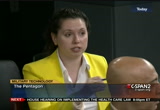tv U.S. Senate CSPAN April 24, 2013 5:00pm-8:01pm EDT
5:00 pm
they've gotten the right amount of money? mr. wyden: the senator's right that certainly those jurisdictions could challenge oregon. it goes to the question, again, of the systems aren't in place so let's just kind of force, you know, oregon to do it even though the systems haven't been available. and there are actually more than 9,000 separate taxing jurisdictions. now, what we've been told by the proponents of the bill is they are going to get this down to a smaller number of systems than 9,000. but, again, that's why it ought to be possible, if the senator from illinois and the senator from wyoming will negotiate, you know, with us, to work something out here. we have given them on paper several proposals to try to find some common ground, where our
5:01 pm
constituents, folks in oregon especially, but they're in new hampshire, montana, and other states that have made their own judgments, would have the ability to shape some of our own decisions here. as my colleague knows, washington state has a sales tax. we don't have a sales tax. so our region alone shows that if you could allow states to come together and make their own voluntary judgments, it's pretty clear that folks in washington believe that they've made some of the right decisions for their economy and individuals; we've made our own. but the fact that a state with a sales tax and a state without a sales tax exist and quite peaceably next to each other to me is a pretty good argument why senator durbin and senator enzi should work with us to have some kind of voluntary come passage of the. mr. merkley: as i think about those small businesses that would be subject to so many jurisdictions that they now have
5:02 pm
a tax relationship with a responsibility to collect for and the possibility of them basically calling up and saying, well, you didn't do it right, give us the right amount. you didn't use the right software, you didn't do this and that. i can't imagine any small business wanting to be exposed -- you pointed up to 9,000 -- and even if it is icl consolidad into 800, that's still over whelming. but then the question comes, do those states have the power to audit the oregon small businesses as collectors of a tax, just like they might audit any person -- any other group who was collecting sales tax for their state? mr. wyden: again, it sure looks like those are going to be the kind of burdens that our states, the ones without a sales tax, are going to be subjected to. now, the proponents say, "no" not going to happen. there's going to be magically all of this software and all of
5:03 pm
this technology, so if anybody wants to come back and look later, this is not going to be hard to respond to, and i just know, looking at all of the businesses that have been in touch with us, a to z, win wineworks, for example, we have clothing stores -- queen bee, a quintessential small business, senator merkley, employing eight skilled staff members who all help to bring the designs to life at the hive on north williams street? port laifnltd yo-- in portland. you and i know them. they're locally crafted in port land. and rebecca peercy there said, "building, running, and maintaining a web site is
5:04 pm
expensive and commit cayed enough. i can't imagine having to include the additional infrastructure of charging and paying sales taxes to states outside of oregon." these are real businesses, the six, to eight people who hear when they're going to have to pay, they're going to run the risk of having these kinds of aids and the like and that maybe there's going to be soft weigh and computers for them to take care of it, they're saying, you got to be kidding. we can't put our business at risk on the promise of that kind of hope and washington promise. mr. merkley: i appreciate your expanding on that, and as page 6 of this bill, there is a line that starts out very promising "relieve remote sellers and certified software sellers of liability for incorrect collection or remittance. " that sounds -- okay, that sound like you're not subject to an audit. "only from basically an error in
5:05 pm
the software provided by the state." in other words, if you make a mistake, you are subject to all the same things as if your effort was inside the state of new york and that means subject to the state organizations inside the government of new york, that means audits, that means fees. it could include court actions, and so we are talking about as you put it, 9,000 jurisdictions that now can make life completely unmanageable. it would only take two or three to make it unimagineable. now, my colleague from illinois has said, well, it's okay for small business because we've put in an exemption for selling $1 million online. that is no kind of an exemption at all. let me just explain. let's say you are a small business and you're selling $1 million online an you have a 5% margin. that means you're making $50,000 a year.
5:06 pm
and after you basically recognize that a person is working for themselves, they have no benefits separate from that, that is a very modest middle-income family. that's one person. so this has an exemption for only a business of one. a modestly successful business of one. which means, every other business in the state is subject to this provision that is engaged online. and so while others may feel comfortable telling their home state small businesses -- and this would include those in the 45 sales tax states -- that they're subject to audits and fees and court action from,000 other entities -- from 9,000 other entities, i am certain will i not comfortable telling the small businesses of oregon that they're going to be facing this type of incredible bureaucracy created by some of the folks that come to the floor and say they're all about small
5:07 pm
business. and now they want you to be aided and fee'd and asked to turn up in some other state for a hearing. and that is just an outrageous attack on small business, mott tomans for our states that do not -- not to mention for our states that do not have a sales tax and attacking states' rights. mr. wyden: mr. president, i couldn't say it any better than senator merkley. i think he has characterized what this legislation is all about better than anybody i've heard on the floor of the senate. and i a been in this debate -- and i've been in this debate for atquite a while here. it is about coercion. it is about putting those small businesses senatormarkl senators talking about through a bureaucratic water. it directly violates the prolix
5:08 pm
in the internet tax freedom act on discriminatory taxes, and again with the sponsors of the legislation, i want to repeat that i and senator merkley, senator shaheen, senator ayotte, the two montana senators, we have put down on paper -- on paper, colleagues -- specific offers to try to work this out. senator merkley and i understand the votes that have been cast. we can count. that's part of how you get to be a united states senator. the nuclear from illinoithe sens not responded to any of the offers that we've made in writing. we'd like to walk through this process and find a way to have some opportunity to tell our constituents, particularly the ones that senator merkley
5:09 pm
correctly identifies as being small and going through all of these bureaucratic water-torture drills, that they are going to be able to shape their own future. washington has a sales tax. oregon doesn't. the senator from illinois keeps talking about how oregon is going to be some huge haven, if we get an opportunity to initiativinitiate a voluntary c. that hasn't happened today, when you have one state and another where the border is, as my colleague know, very close. we've kept the peace. we can work these approach, you know, out. and to have senator merkley and i concede on the major point, which is the provision that gives a foreign retailer a leg up in this bill, which i think is a very serious defect, and i think a lot of senators who vote for this bill, when they see it is going it be a huge advantage for foreign retailers, they're
5:10 pm
going to have some real misgivings about that. we gave that up for purposes of this. we have made concessions, and we can't even get an offer in writing about something to negotiate that would incorporate a way to protect our states from the kinds of features that you, senator merkley, have correctly described, and i especially appreciate your going through the specifics, as you always do. i mean, you cited the fact that this legislation has a provision that basically compensates people for errors which suggests to me that they think there are going to be a bunch of errors and the reason he think that is because they're right, as my friend from wyoming know, because they staw in the effort to try to sort this out during the streamlined sales tax discussions that have gone on for so many years. i want to yield to you for the last word, but it's a pleasure to partner with you on so many issues, and i think you have described it today as well as
5:11 pm
anyone has in this discussion. i thank you for all your leadership, and i yield to you for closing it up, as our small businesses in oregon, like that oregon association of nursery america's have been talking to us -- of nurser nurserymen, havn talking to us about. mr. merkley: i thank my friend for your longtime defense of the internet as a place of fair transactions for small businesses and large, tax-free zone. and i hope in this chamber is not engaging in a course that is going to change that dramatically as it seems so intent at this moment. i'm very struck by the correct point you make about foreign companies. so here we have a company in canada that isn't subject to this bill. we have a company in mexico that is not subject to this bill. for that matter, we have a company in nigeria or anywhere
5:12 pm
else in the world not subject to this bill. and so when american businesses say, we should maintain a level playing field to keep business in america, allow us to play on a level playing field, they're certainly hoping that we won't pass something like this, which gives such an enormous advantage to other nations. and i must say, constituents have been weighing in on this, and i don't think it would surprise anyone that they don't like it. 98% are writing in to us to say, we don't like it, we don't like the idea of other states auditing our businesses, we don't like being u.a.e. asked te being asked to be a tax collection agency for another statement oregon is not asking any other state to do that
5:13 pm
unless they have a state-to-state compact, which is exactly the way this could have been done and should have been done but hasn't been done because the states couldn't agree, even though they were both sales tax states. that tills us quite a lot. they don't like the idea of being subject to both bureaucrats or the potential for legal action, where they might have to travel to another state. and they don't like the idea that there is absolutely no compensation for the enormous imposition this bill places on the small businesses of oregon. that's quite a lot not to like. so, of course, it is 98% against this bivment and i thought i would read one such letter. "please do not support the marketplace fairness act. it is not fair to businesses like mine that other states can tax my oregon-based companies." "the voters of oregon have
5:14 pm
continually voted down tales taxes as a way co collect teals sales taxes. if these states have problems with their collection, they should figure it out with the help of their local populous. my company is able to compete and create jobs on a level playing field. the dynamics of this fight will have consequences for mid-sized retailers, especially companies based in oregon. there are big retailers that are fighting to limit our ability to compete with them. their goals are to have local footprints and employees across the country in major metropolitan markets and they should pay those local taxes and fees where they are present. companies like mine that have not chosen to be in that model should not. please continue to support the internet-free market. please protect oregon business and maybe create some new opportunities." that's what we should be doing in the u.s. senate, creating new opportunities for oregon small businesses to succeed in this tough economy. that's with an exclamation point
5:15 pm
from this business in oregon. and i'll repeat that sentence since the writer stressed it. "that's what we should be doing in the u.s. senate, creating new opportunities for oregon small businesses to succeed in this tough econom economy! opposite of what we're doing here. maybe oregonians are overwhelmingly opposed to this bill. well, i think it becomes clear that there are some ideas that if someone passionately believes and they're willing to try it out, willing to develop a pilot project before they impose it on the entire nation, and certainly out of the 45 states, since so many have come to the floor representing their states, to passionately say this should be done, why don't you have a pilot project among your states? demonstrate that this is not going to be a burden in which there are audits and fees and court appearances and phone
5:16 pm
calls from some 9,000 jurisdictions that my senior colleague and i point out. why don't you demonstrate that first before you decide to run attack on small businesses in the state of oregon and for that matter across this nation? how about that? that is a fair proposal. run a pilot project if you love this idea so much, do it among yourself and demonstrate it and bring the report back here to this chamber for further conversation. but the idea of coercing my citizens of the state of oregon to do your work with enormous imposition and uncertainty when they're trying to succeed as small businesses, in which small businesses are the power of creating jobs in this country, that is wrong. and so for those who speak about the heavy hand of government, those who speak about the power of small business, those who speak about bureaucracy and imposition, then live your words
5:17 pm
in action and kill this vicious attack on small business across this nation. thank you, mr. president. mr. durbin: mr. president? the presiding officer: the senator from illinois. mr. durbin: mr. president, i understand the passion of my colleagues from oregon. oregon is one of five states with no sales tax. i know that they have voted down a sales tax by statewide referendum repeatedly by margins of two to one, i'm told. it is clear they have a passionate feeling about no sales tax in oregon. here's the good news. the bill that senator enzi and itch introduced and want -- enzi and i have introduced and want to pass in the senate will not impose one penny of sales tax obligation on anyone living in oregon, whether they're purchasing over the counter or purchasing over the internet. not one penny of sales tax liability. their states' rights are protected. their passion against sales tax is honored. the same is true in alaska,
5:18 pm
montana, new hampshire and delaware, all the other no-sales tax states. but this is what it really gets down to. this isn't about the people in oregon paying a sales tax. it's about the businesses, internet businesses in oregon that want to sell into other states and not collect the sales tax owed to that state. that's it. and we're not forcing them to sell in illinois or wyoming. that's a business decision they're making. we're just saying if you sell, collect the sales tax required by illinois law, wyoming law, connecticut law. that's what it comes down to. and why is it important? it's important because businesses in our states, small businesses are competing with internet retailers who get an automatic discount when they don't collect sales tax. and i listened to the explanation given by one of my friends from oregon here, and he said that i'm defying the natural forces of the free-market system where
5:19 pm
good-quality goods are chosen over lower-quality goods. well, i can't argue about the pine trees that are grown in oregon, because i don't know if they are better than the pine trees grown in washington or some other place. but we are dealing in many instances here with identical goods. the nike running shoes that you can buy at chris cooze sporting goods in normal, illinois, or buy over the internet with no sales tax. it isn't a question of good quality versus bad quality. it is a question of sales tax or no sales tax. what the oregonians suggested to us is what they consider to be a perfect solution. remove any requirement for their internet retailers to collect sales tax from anybody. therefore, there be no federal mandate. well, let me remind them. there is no federal tax in this bill. there is no new tax in this bill. state and local, or federal. all we're asking for is the basics. the oregonians want to sell in
5:20 pm
an adjoining state like california, they'll collect the sales tax owed to california and pay it back. then i listened to him describe how onerous this would be. right now ebay, which is no friend of this bill, ebay offers a service available to businesses that they can buy that will tell them the exact sales tax to be collected based on your zip code and address, and that service cost -- listen to this onerous cost -- $15 a month. $15 a month. if you want to go to the highest cadillac version, $140 a month, less than $2,000 a year. incidentally, in our bill, we require the states that are asking for the collection of sales tax to provide free of charge software to every internet retailer so that they can collect this without any expense to their business. this is not onerous. it's not unfair. it is just basic leveling the playing field. i want to yield the floor to my
5:21 pm
friend from wyoming, my cosponsor of this measure. the presiding officer: the senator from wyoming. mr. enzi: thank you, mr. president. i'd like to -- senator brown was here earlier and wanted to be able to speak shortly. so if when i finish my remarks, if he's here, i'd ask unanimous consent that he be able to speak. i want to talk about what we've just heard here, an implications that we're not champions of small business. i was in small business. i had shoe stores, retail shoe stores. so that's why i know some of these problems. i know about the people coming in trying on the shoes, getting exactly what fits and having all of the service of looking through all the styles and that sort of thing and hen leaving and making -- and then leaving and making a purchase on the internet. talking to other retailers, that's not the biggest
5:22 pm
irritation. they buy it on the internet. it does have a problem -- and every product has the potential of having some problem -- they bring it back to the store where they got the free service, didn't buy the shoe, and they ask for it to be replaced. i hope people can see the inequity in that. but we're not talking about the small business like the shoe store i had. we're talking about small businesses that are selling online and they're doing over $1 million a year in sales. i don't think people would consider that to be a really small business. $1 million in sales. if they're doing $1 million in sales, you can pretty much guarantee that they're automated. they're automated in their manufacture. they're automated in their sales. that means they have a computer. not many businesses function today without a computer. and if they have a computer, you would be amazed at some of the
5:23 pm
things those computers will do. i go back to wyoming almost every weekend and visit businesses. i visit businesses so they can tell me what kind of problems the federal government is causing for them. i'm amazed at the automation that they have. i'm amazed at what they're able to do. and most of it is because of computers. and now we're saying -- and i think that computers kind of started out on that coast -- that computers just don't have the capability to do these kinds of things to be able to figure a sales tax? all you've got to have is a zip code and it eliminates the 9,600 jurisdictions that we're talking about here. that computer can figure that sales tax and at the end of the month that same computer will have kept track of all of this stuff, and it will do the reports that are necessary. electronically. probably can do that with about five or six key taps. maybe less than that.
5:24 pm
i'm sure they could actually be set to send the report on the last day of the month at a specific hour. that's how computers work. so an argument that this can't be done, i don't think anybody will buy that. and the states wouldn't be willing to provide those programs free of charge and then put in the protections from liabilities and errors if they weren't sure that they could do it. that's the reason they put in those protections for the retailer, is because they're sure that it can be done. and i was fascinated by the audits. if they're using that computer program, how could they vary from what they actually take in to actually sell? the program takes it in. the program holds it. the program sends it out with the report. not a lot of room for errors.
5:25 pm
they're going to audit the firm that looks like it's shipping everything everywhere and not reporting at all. that's what accountants do. they figure out the high risk. they're not going to go in and look for pennies here and there. they go in and look for enough to at least cover the cost of the audit. if you're not doing probably 10 or 20 times the value of the audit, you're not going to be hired to do many of them. so those that are complying, that are using the program, they're not going to have any problem. but this exempts all the businesses that are doing less than $1 million online in a given year. until you do $1 million online in a given year, you're exempt from it. a lot of those -- i would imagine a lot of those nurseries don't hit the $1 million mark. they would like to hit the $1 million mark, and i would like them to hit the $1 million mark. and if they got to the $1 million mark, i think they'd be so overjoyed they'll say i'm
5:26 pm
automating on the computer because maybe i can do $2 million worth of sales if that's the case. comments on the streamline sales tax, my state was one of the first ones to get into it. so was south dakota. so was nebraska. and another 21 states besides those. and the comment was you can't streamline this. what kind of incentive has there been for them to streamline it more? the purpose of the compact is to streamline it more, but at the moment they're having to protect their sales within their state to make sure that they're not losing the revenues that they were already counting on. and they knew that there's this little supreme court case that's now 20 years old that challenged us to fix it. and that's what we're trying to do here, is fix it.
5:27 pm
and if that fix goes in, i'm betting a lot more states will join the streamline sales tax and will streamline more than what we envisioned. but even if they don't, there are requirements in here that keep it uniform enough and with the computers we can show examples of how people already do this sort of thing on the computer. that should take care of a lot of their problems. i would yield the floor, and under the previous unanimous consent, senator brown. the presiding officer: the senator from ohio. the senator from ohio. mr. brown: thank you. and i thank senator enzi, the senior senator from wyoming, for his good work on this legislation and for his always courteous demeanor. mr. president, i ask unanimous consent to speak as if in morning business for up to eight minutes. thank you, mr. president.
5:28 pm
this week senator durbin and i are introducing the working families tax relief act with the majority of my democratic colleagues on the senate finance committee. for a number of years one area of bipartisan agreement in washington has been on the need for comprehensive tax reform. tax reform can clear the code of wasteful carveouts, special interest loopholes. senator enzi was part of a meeting, a bipartisan meeting sitting around the table talking about these issues just last week. we understand that comprehensive tax reform can place american companies on an even footing with foreign competitors. it can reduce the deficit, can provide a shot in the arm to economic competitiveness and growth. on that, there is agreement with what comprehensive tax reform should not do -- and there is general agreement on this also -- is undermine the earned-income tax credit and child tax credit. these credits are the single-most effective incentive to increase low-income parents
5:29 pm
participating in the workforce and reward work and promote family formation, all goals which we, i believe, all seek. that is why support for these programs in the past has been broad-based and bipartisan. president reagan, former representative jack kemp, former running mate to -- in a presidential election to senator dole, were champions of the modern income tax credit. when it was expanded in 1986 president reagan said it is the best antipoverty, the best profamily, the best job creation measure to come out of congress. he was right. in ohio, some one million households received eitc, the earned-income tax credit. 660,000 households received the c.t.c., the child tax credit on average in the three years of 2009, 2010 and 2011. that's why this week senator durbin and i, along with most of our democratic colleagues, are introducing the working families
5:30 pm
tax relief act. our bill would make permanent the 2009 levels for the earned-income tax credit and child tax credit. it would index the child tax credit for inflation. it would allow workers without children to access the full earned-income tax credit. it would reduce the full earned-income tax credit access age to 21. it would simplify the filing process to reduce fraud because there is some acknowledged fraud in this program as there is throughout the tax system. and i want to, and i've pledged to many of my colleagues on both sides of the aisle as this bill moves forward to work to reduce that fraud. the recovery act of three years ago expanded -- four years ago expanded access and refundability for both the i.t.c. and the ctic. it was meant to respond to the great recession but it would ensure that the country's finest antipoverty programs keep up with the times. making these credits permanent
5:31 pm
at the current level is critical to fighting poverty. in 2011, the i.t.c. and c.t.c. lifted 10 million people including five million children out of poverty. the i.t.c. has helped nearly half a millioningle mothers enter the work force. these credits don't just reward work, they provide lifelong benefits to children. we know that from studies that it improves health outcomes, it increases earning potential for children in low-income families becauses pulled up out of poverty have advantages -- can give advantages to those children that pay off later in life that they couldn't give to those children in those families if their incomes were below the poverty line. expectant mothers who receive the i.t.c. are more likely to receive prenatal care. these aren't opinions. these are facts. newborns are more likely to experience low weight and premature birth. behind all these statistics, mr. president, are real people, people whose lives and
5:32 pm
opportunities are improved because of these credits. let me share a story. michelle eddy, a cleveland native, isgle s mother who works hard to support her two daughters. one is 9, the other is 4. this year, the neighborhood housing services of greater cleveland helped ms. eddy prepare her tax return. she is able to use the credit she received from earned income tax credit and child tax credit to pay for school supplies, uniforms and daycare for her two daughters. she had worked in a retail store as a shift manager for five years. she recently, though, started a new job as a restaurant server so she can spend evenings and weekends with her daughters. without eitc, without ctc, she would certainly have to work a second job to makes end meet, leaving her children at home without her far too often. the i.t.c. and the c.t.c. aren't what make michelle eddy a good mother, but they enable her to
5:33 pm
be there for her children when they need her most. right now some 30% of children under the age of 3 are in families with too little earnings to qualify for full c.t.c. nearly 3% of children under 3 are in families with no earnings and as such get no i.t.c. or c.t.c. we know the child tax credit is not indexed for inflation. by the end of the decade, another one million children will be forced to grow up in poverty. the c.t.c. needs to be more robust. we need to reform the tax code now. i'm very hopeful that senator baucus in his last year and a half in the senate, with ranking member hatch and leaders on that committee like senator wyden and senator enzi and others, can reform the tax code, can put measures in place to prevent fraud as we introduce the working families tax relief act, i remain hopeful that our colleagues across the aisle will work with us to make these credits a part of tax reform. mr. president, i yield the
5:34 pm
floor, and again thank senator enzi. a senator: mr. president? the presiding officer: the senator from tennessee. mr. alexander: thanks, mr. president. i have enjoyhe discussion on the marketplace fairness act. it's good to have a good debate. looking forward to voting on amendments that are here. i'd like to address two or three points that have been made during the debate. the first is -- the first is about what we call here regular order, that we had -- what we mean by that is the bill is introduced and that it goes to a committee and the committee reports it to the floor and we bring it up on the floor and we have a debate and then we vote on it. we'd like to see more of that around here. well, the problem with this bill is that the finance committee wouldn't act on it. i mean, let's just be straightforward about this. this bill has been around a long time, and the finance committee chairman is the only one who
5:35 pm
really can schedule a hearing and cause it to be acted on, he didn't want to do that despite the fact that we asked him to do it. so as a result, the majority leader used a procedure that brings the bill to the floor. just to underscore that, let me ask consent to place into the record a timeline for the marketplace fairness act that details the steps that we have taken since 2001. the presiding officer: without objection. mr. alexander: to summarize some of these steps, this began in the 107th congress in 2001. senator enzi started even before that, i think. senator dorgan introduced the internet tax moratorium and equity act in 2000 and 2001. and then in 2003, the streamlined sales and use tax act was introduced by senator
5:36 pm
enzi. that's ten years ago. and then again in 2005 and 2006, senator enzi and senator dorgan. and then again in 2007 and 2008, senator enzi. in the 111th congress, no bill was introduced, but now we're getting to a little more recent history. last congress, 2011 and 2012, senator durbin introduced the main street fairness senator enzi joined him in that and it was referred to the senate finance committee. so for all that time, the finance committee has had an opportunity to work on this legislation in the way they said they thought it should be. and -- and there were hearings in the senate commerce committee in august of 2012 on essentially
5:37 pm
the same 11-page bill that has been introduced here today and that we're acting on. it was a partial hearing in the senate finance committee during that year but that was all. and then in this year, in february on valentine's day, senator enzi introduced the marketplace fairness act that we are debating here. this 11-page bill. and there was a letter from 16 senators, republicans and democrats, asking the finance committee to hold a hearing and to deal with it, but it has not. so i respect the decision of the chairman to be opposed to the bill and not to -- to hold a hearing and not to report the bill to the floor, but if he does that, then i would suggest he should respect the right of the majority leader to bring the bill to the floor and allow the senate to debate it. and as far as the regular order
5:38 pm
goes, a week should be long enough to consider this bill which has been in one form or another around since 2001, and we could have begun debating amendments on monday. that's when we -- the bill came to the floor, but the opponents filibustered it. now, this wasn't a republican or a democratic filibuster. it was both -- both sides with opponents. what that deprived us of was an opportunity to debate and vote on amendments on monday and on tuesday. now, we had another vote. so we have now had three votes, one during the bget session, one on the cloture on the motion to proceed and then one on the motion to proceed itself, and we have gotten 74, 75 votes each time, and it's a majority of the democratic senators and it's a majority of the republican senators.
5:39 pm
this doesn't happen all the time that we have such strong majorities on each side of the aisle saying in three successive votes of 74 and 75 votes we favor an important piece of legislation. so i would hope that the better course would be to come to some agreement that we could take the amendments that we have here from democrats and from republicans, bring them up, table them, vote on them, debate them and act on this and bring this to a conclusion this week. and then there is substantial support in the house of representatives for this. the bill could then go to the house. the house could do whatever the house wishes. there could be a conference and we could get -- and we could get a result. so every attempt has been made by the sponsors of this legislation since 2001 to bring this through the regular order, which means take it through the committee. and the opponents of the idea have chosen, first in the
5:40 pm
finance committee, to not allow there to be a markup of the bill, and then on the floor to not allow us really to debate amendments. for example, some people say that this legislation taxes the internet. of course, that's 100% wrong because there is a federal law banning state taxation of the internet, and senator pryor of arkansas saw it -- sought to extend that ban for ten more years today, and the opponents of the bill objected, even to a vote on taxing the internet. so -- so this is very disappointing, and that is the information about the timeline that i wanted to put in. here is some more information that i'd like to ask unanimous consent be included in the record at this point. the presiding officer: without objection. mr. alexander: thank you. these are letters from senators
5:41 pm
to the leaders of the finance committee. the first letter is dated january 31, 2012, last year at the beginning of the year, and it goes from five democrats and five republicans who introduced the marketplace fairness act, asked for a hearing, asked for the committee to act. that's the first letter. the next letter came this year on february 14 from 16 senators, both parties, to the finance committee asking the finance committee to act on the marketplace fairness act. then there is a letter to the leaders of the finance committee from the national governors' association, chaired by -- signed by the democratic governor of washington, the republican governor of tennessee, asking the finance committee on behalf of the states to consider this
5:42 pm
legislation and act on it, and the finance committee elected not -- not to do that. and this information will be part of the record. and finally, there is also a letter dated april 22 of this fl governors' association urging senator reid and mcconnell to pass this legislation. and i ask consent that it be included in the record. the presiding officer: without objection. mr. alexander: now finally i ask consent to include in the record the names of the governors and former governors who support this legislation. the presiding officer: without objection. mr. alexander: thank you. thank you, mr. president. i do that with a little bit of obvious bias as a former governor, but -- but i think it's important to -- that the country know what the governors think because the legislation that we're talking about today
5:43 pm
is a states' rights bill. it's an 11-page bill. it's a very simple, straightforward bill. it simply says that tennessee, alabama, virginia, new jersey, any state has the right to decide for itself whether it wants to collect taxes that are already owed from some of the people who owe the taxes or all the people who owe the taxes. that's it. that's it. that's all it does. and the governors who support it are the governor of alabama, virginia, new jersey, south carolina, nevada, iowa, south dakota, maine, pennsylvania, indiana, tennessee, michigan, the governor of idaho, arizona, louisiana, florida, georgia, rhode island, kentucky, hawaii. i just read a bunch of republican governors. now i'm into the democrats. kentucky, hawaii, arkansas, california, minnesota, colorado, maryland, connecticut, missouri, massachusetts, illinois, and west virginia.
5:44 pm
and the former governors include mitch daniels, jeb bush and the governor -- former democratic governor of washington. now, mr. president, so here we have a bill on the floor that we voted on three times already that has a majority of the democratic senators and a majority of the republican senators and 75 votes three times -- 74 one time, 75 twice. and the bill also has the support of a long list of republican governors, actually more republican than democratic governors. yet we have got some people in washington who say we don't trust the states to make these decisions. i wonder if these people have ever read the constitution of the united states. i wonder if they know what the tenth amendment says. this was a very important part of the creation of this country. sovereign states created this country. sovereign states had reserved for them their powers. they didn't expect to come to washington and play mother may i to a bunch of senators and congressmen who fly up here on airplanes and think they are smarter than they were when they
5:45 pm
left nashville or memphis or wherever their hometown is. th the purpose of this bill is to leave within the states the responsibility for making decisions. some peopl up here think they know best. maybe they do, maybe they tonight. tennessee doesn't have an income tax. i'd like for every state not to have an income tax but i'm not going to impose that from washington just because i'm a united states senator. tennessee doesn't -- has a right to work law. i'd like for every state to have a right to work law but i'm not going to impose that from washington. states have the right to be right, states have the right to be wrong and washington has no business telling sovereign states what its tax structure ought to be. and washington certainly has no business standing in the way of states stopping discrimination against taxpayers and businesses because that's exactly what we're doing if we don't act. we're perpetuating discrimination, most conservatives i know don't like
5:46 pm
picking and choosing between winners and losers. they don't like treating one taxpayer one way and one in a similar situation in another way, one business one way and one another way. that's exactly what we're doing if don't want act. we're discriminating against the shoe store in wyoming, against the boot store in nashville, against the small store in maryville, tennessee, we're saying if your competitor outside the state sells something, he does not have to collect the sales tax. that's why leading conservatives like the chairman of the conservative union, william buckley before he died and art laugher, the economist -- art laffer and mitch daniel and chris christie, that's why these conservatives say they support the bill. now, we're not even deciding here whether states will collect
5:47 pm
taxes whether from out-of-state sellers or not. we're just saying states have a right to do it. of course, they have the right to do it. that's why i'm including this list of governors. i think it's part of our job as united states senators to respect the sovereign states from where we come. to respect the rights of states, to not think that just because we're in washington, we know better. most tennesseans don't like that. i know when i was governor nothing used to make me madder than a bunch of legislators coming up with some bright idea in washington, passing it, turning it into a law, holding a press conference, take credit for it and then send the bill to me and next thing you know they'd be home making a speech at the lincoln day dinner or jefferson day dinner about local control. and the idea that people in
5:48 pm
washington would say that we don't trust the states to make decisions about how to spend money, look at our record. running up trillion-dollar deficits every year, borrowing 26 cents out of every dollar we spend. i come from a state that has no state debt on roads. has a balanced budget every year. has a triple a bond rating. i trust governor haslam and the speaker of the house and the republican legislature a lot more than i do the united states senate and congress to make decisions about tax dollars. i think i know pretty well what they'll do if they have the power to do it. i suspect they'll say we're not going to pick and choose winners and losers. i know they'll say that because the governor and lieutenant governor have told me that and i suspect what they'll,s will bring in more revenue so we'll lower our tax rate because we'll start collecting money from all the people who owe it instead of some of the people who owe it. and it is correct that some governors have already said that. we were told today that in ohio
5:49 pm
they've already said if this bill passes, they'll collect money from everybody who owes it's and then lower their income taxes. art laffer said in "the wall street journal" that's precisely what we ought to do to stimulate growth. if we're going to have a tax, the best tax said mr. laffer, is a tax that covers the largest number of people at the lowest possible rate. if that's the case, what we're perpetuating with inaction is the worst kind of tax which is a tax that states are allowed to tax a smaller range of people at a higher rate. this permits them to tax all the people who are in a similar situated place at a lower rate if that's what they choose to do. and the arrogance of those in washington who would say they don't trust the states to make those decisions, they need to go back to the seventh grade and read the united states constitution and learn a little american history where this
5:50 pm
country came from. so i'm very proud of this senate for for on this important issue led by senator durbin and senator enzi, coming up with 75 and 74 votes three consecutive times to say we believe in a two-word principle on this 11-page bill, states' rights, or tenth amendment, that we will recognize the power of states to make their own decisions. and if we don't act, all these claims about what happens in the 9,600 jurisdictions will come true because some governor -- i know i'd do it if i were still there. if the senate doesn't act on this, i'd go back to the supreme court. and i will bet that 20 years after the quill case that senator heitkamp brought back behalf there was an internet when the court then says that requiring out-of-state sellers to collect the tax was burdensome, they'd look at the internet, they'd -- those
5:51 pm
justices know they can find out the weather in their hometowns by putting in the zip code and the name of the town and they know that an out-of-state seller can figure out the sales tax by -- from the zip code of the buyer. they know that. and i will predict they would hold it is not an undue burden and then all the out-of-state sellers, then they'd really have 9,600 jurisdictions to deal with. we're simplifying, creating something that will work, following a process that is well tried. there are a great many of catalogue and online sellers that today do exactly what the instate sellers do, do it through the zip code over the internet. we're saying everybody should do that except those who have revenues of less than a million dollars a year and they don't have to do anything under this law. and according to many economists, that takes 99% of the online sellers out of the effect of this bill.
5:52 pm
so we have tried to bring this through the regular order. we're down here trying right now. we've gotten substantial support, there have been hearings, there's a lot of work in the house, there's broad support from the governors. i'm hopeful that we'll move forward tomorrow and finish this legislation, send it to the house and take a step toward recognizing the constitutional framework of our country by honoring the sovereign states' rights to make decisions for themselves and stopping this attitude of requiring governors and legislators to come to washington and play mother may i with responsibilities that ought to be clearly the responsibility of states. i thank the p i notice the absence of a quorum. the presiding officer: the clerk will call the roll. quorum call:
6:02 pm
a senator: mr. president? the presiding officer: the senator from rhode island. mr. with whitehouse: mr. whitehouse: i ask unanimous consent the pending quorum call be lifted. the presiding officer: without objection. mr. whitehouse: i ask unanimous consent to speak as if in morning business for up to 15 minutes. the presiding officer: without objection. mr. whitehouse: i come to the floor again to address climate change particularly today, the
6:03 pm
change that carbon pollution is wreaking in our oceans. water temperatures are increasing, sea level is rising, ocean water is growing more acidic, and powerful storms are becoming more frequent and more intense. it is time to wake up to the threat to our oceans and coasts posed by carbon pollution. the rate at which carbon is now being dumped into the atmosphere and absorbed by our oceans is unprecedented. noaa estimates almost one million tons of the carbon dioxide we dump into the atmosphere is absorbed into the oceans every hour. one million tons of hour. we know with scientific certainty that carbon pollution causes the oceans to become more acidic. indeed, we measure that carbon pollution has caused the global
6:04 pm
p.h. of the upper ocean to increase nearly 30%, by some measures nearly 40% since preindustrial times. in rhode island, the ocean state, coastal activities define our heritage, our culture, and also our economy. our coastal waters are spawning grounds, nurseries, and shelters for fish and shellfish which we enjoy and from which we profit. our shores and coastal ponds are barriers to protect our coastal communities from ocean storms and that naturally improve water quality. our oceans and coasts make coastal states like ours, mr. president, who we are. we will continue to take advantage of the ocean's bounty, as we should. we will trade, we will fish, and we will sail.
6:05 pm
we'll dispose of waste. we extract fuel and harness the wind. we will work our oceans. navies and cruise ships, sailboats and supertankers will plow their surface. we cannot undo this part of our relationship with the sea. what we can change is what we do in return. if we use our best science and judgment to plan for the uses of our oceans, we will continue to reap the value they provide. carbon-driven changes to our planet will continue and will accelerate. the faster you're driving, the better your headlights need to be. our headlights in this area are scientific research and planning. as we move ever faster into this uncharted territory, our headlights had better be working to preserve the valuable ecosystems upon which our communities and economies rely.
6:06 pm
the national ocean policy signed by president obama in 2010 provides a commonsense framework for sensible research and planning and public-private cooperation as we face the significant challenges bearing down on our oceans and coasts on both our ecosystems and our industries. last week, the white house released the national ocean policy implementation plan, a blueprint for effective management of our oceans and the great lakes. it's not easy to balance the competing needs of commerce, conservation, culture, and recreation. more than 20 federal agencies oversee our marine industries governing everything from fisheries to oil and gas leasing. the implementation plan takes this on and moves us toward better and more collaborative management of ocean resources. the implementation plan gathered the thoughts of a wide range of
6:07 pm
key stakeholders, mayor time and energy industries, conservation and recreation interests, academic experts, and federal, state, local, and tribal governments. the plan supports economic growth by streamlining permitting and approval processes, by improving mapping and ocean observing and by operating greater access to dealt and information. the plan lays out specific actions and timelines to protect and restore coastal wetlands and reefs and prevent job losses by degraded shores and degraded waters. our coasts need immediate attention so the plan could not come too soon. it states and i'll quote, "our nation lost nearly 60,000 acres of coastal wetlands each year between 1998 and 2004. habitats are being altered by invasive species that threaten
6:08 pm
native aquatic life and cost billions of dollars per year in natural and infrastructure damage. the implementation process that the administration is pursuing is all about local needs and concerns. so the national ocean policy establishes voluntary regional planning bodies. local pe -- local people can gather together, layer together data and promote greater uses of their ocean's resources. in english glands -- new england, we've seen the value of this cooperative ocean planning. rhode island's ocean special area management plan -- special area management plan is called a samp in the trade. the samp has made ecosystem restoration and industry interests advance simultaneously. i recently spent time at the northeast regional planning body meeting in rhode island and i know that our region is excited
6:09 pm
to move forward with a regional process. so let's look at some of the practical results when you get the information and the affected people in the room together. in rhode island, it is wind energy industry with its vast potential for manufacturing and maintenance jobs, is rapidly developing wind farms off of our coast. thanks to the groundwork that was laid by the rhode island samp, wind developers move fairly smoothly through the regulatory thicket and they avoided interference with marine highways, critical fisheries, habitats and naval training ranges. they're actually quite a good report that i commend all my colleagues on the ocean samp published by the rhode island special area management plan. it's a practitioner's guide and it's a very effective document that shows how well this worked.
6:10 pm
in this process, local people were listened to and they were heard. when the federal bureau of ocean energy management announced this wind energy area here off of the rhode island coast, there was an area named cox's ledge. and the fishermen were concerned with the way that the floor of the ocean was there at cox's ledge made it a particularly risch fishing ground and they didn't want it interfered with by having the -- that area put up for wind farm development. and sure enough, when it is map came out, you can see the curve of cox's ledge going right through the middle of the wind farm area, protected for the fishermen. they were listened to and they were heard. so much of this is simple common sense. in massachusetts, the endangered north atlantic white whale, a
6:11 pm
population of about 450 of them, feeds in the waters just off of boston. and the whale strikes between shipping and the right whales were becoming a problem and because the right whale is endangered, it was becoming a real risk for shipping going in and out of boston harbor. so they found data that showed where the whale were likely and they mapped the data. and when they mapped the data, they showed if they just moved the shipping channel out of boston harbor up a little bit, they could come through an area that was largely safe from whale strikes. the cost to the industry? somewhere between 9 and 22 minutes of extra transit time. virtually nothing. while the number of whale strikes has dropped significantly. here's another example from
6:12 pm
outside of delaware. the green sort of neon colored dots here track the signals coming off of cargo ships going in and out of delaware bay. and as you can see, there's a pretty som solid track coming of delaware bay right through here. well, when delaware first proposed its wind energy areas, they proposed these light green blocks as wind energy areas. and this one, as you can see, was planned right on top of the main shipping channel heading southeast out of delaware bay. critics say that these kind of efforts to get the data and the people in the room together, zone the other an, that's just plain factually wrong. the policy bring together people who use our ocean. in this case, the case of delaware bay, simply putting everybody in the room allowed
6:13 pm
the wind energy areas to be modified to avoid the conflict. and so the southeastern area comes out and the turbine areas are beside it and the problem has been solved. that is not zoning. that is what military officers would call situational awareness. , what the military would call deconfliction. what is reall it really is comm. it's been said, "we must improve how we work together, plan smartly, groas grow our economyp the ocean healthy and grow resoars for now and in the -- resources for now and in the future." shoreline counties in this country generate 41% of our gross domestic product. in 2010, 2.8 million jobs were
6:14 pm
supported by maritime economic activities. commercial ports supported 13 million jobs. energy and minerals production supported almost three-quarters of a million jobs. but all of this activity creates opportunities for conflict. the national ocean policy implementation plan is a blueprint to resolve those wasteful conflicts, to deconflict intelligently and to streamline efforts across the federal government to keep our oceans and our ocean economy thriving. and it lets each region go forward at its own pace. michael keyworth is recent head of our rhode island marine trades association and he helped develop the rhode island ocean special area management plan. he said this. "the national ocean policy implementation plan will enable
6:15 pm
regions like new england to move ahead with this smart ocean planning. by engaging people like me who live and work wiewr on the water everyday while not forcing planning on other regions who do not currently want to engage in that process." mr. president, climate change is upon us and its effects will only accelerate as we continue to spew megatons of carbon into our atmosphere. changes are occurring and they're occurring fast in the oceans. those facts make it all the more important that congress remain vigilant and that we put our full support behind the commonsense framework of the national oceans policy. mr. president, i yield the floor. and i'll note the absence of a quorum. the presiding officer: the clerk will call the roll. quorum call:
6:16 pm
the presiding officer: the senator from rhode island. mr. whitehouse: mr. president, i understand that -- let me ask unanimous consent that the quorum call be lifted. the presiding officer: without objection. mr. whitehouse: mr. president, i understand that we're waiting for another senator to come to the floor. so while we do that, let me
6:17 pm
speak on another subject which is the so-called chained c.p.i.. last month the senate approved a budget that included a blueprint for a balanced and responsible deficit reduction. that budget was skillfully managed by our budget committee chairman, senator murray. it would complete the deficit reduction needed to stabilize our nation's finances with a mix of smart spending cuts and revenue from closing wasteful tax loopholes. top economists have agreed that we need about $4 trillion of deficit reduction to make our finances sustainable, and our budget gets us there. together with the deficit reduction enacted last congress, the senate budget would reduce the deficit by $4.3 trillion. through a nearly two to one mix of spending cuts and revenue,
6:18 pm
two parts spending cuts to one part revenue. house republicans took a very different approach with their budget, making only cuts, drastic cuts to education, to law enforcement, to medical research, even ending medicare as we know it for future retirees. the house budget derives its deficit reduction from cuts that primarily hurt low-income and middle-class americans while refusing to touch a single tax give-away to wealthy and well-connected special interests. senate democrats took a middle course. house republicans produced an extremist tea party wish list. in his own budget plan, president obama included some smart provisions like investments in infrastructure and the buffett rule for tax fairness. and i respect the president's outreach to a compromise with republicans, but i cannot
6:19 pm
support the cuts to social security benefits in his plan. it is simply wrong to place the burden of deficit reduction on seniors and the disabled. social security, one of the fundamental pillars of the american middle class, has not contributed and will not contribute to our deficits. social security is fully funded by its participants through payroll taxes and cannot by law add to the deficit. under current payroll tax level, social security will have the funds to pay 100% of benefits until 2033. it's true that we do need to make some adjustments to ensure that full benefits can be paid beyond that date, but that task has nothing to do with deficit reduction. even if congress did nothing before 2033, the projected shortfall would force automatic benefit cuts, not deficit spending. so i do look forward to working with senators of both parties to ensure that social security
6:20 pm
remains fully solvent for generations to come, but that discussion does not belong in the unrelated debate on our nation's budget deficits. the social security cuts the president has proposed are not just in the wrong discussion, they are wrong themselves. to reflect inflation, social security recipients each year get cost-of-living adjustments, what key call cola's. the president's proposal changes the formula used to make that determination shifting to something that is called the chained consumer price index, or chained c.p.i.. sounds technical, sounds innocuous, but make no mistake it's a benefit cut cloaked in technical jargon. the argument for a chained c.p.i. is that it's a more accurate measure of inflation, that it takes into account real-world decisions that
6:21 pm
consumers make to modify their buying habits as prices fluctuate. as the price of apples go up, you buy more banana, so the overall affect on your budget is moderated. let's take a look at how seniors fare under the existing cola structure. in 2010 -- this year -- and in 2011 -- this year -- seniors received no cost-of-living adjustment whatsoever. 0.0% in 2010. 0.0% in 2011. but according to the existing consumer price formula used by government accountants, prices hadn't risen enough to justify colas. well, that's what the cola formula says, but in real life,
6:22 pm
what did it look like? according to the bureau of labor statistics, seniors saw food prices rise 1.5% in 2010. they saw medical costs increase 3.3%. they saw their gas and home heating oil go up by more than 13% each. 1.5%, 3.3%, over 13% for gas and fuel. and the cola covered zero percent. the next year -- 2011 -- these costs increased again. food prices jumped 4.5%. medical care jumped 3.5%. gasoline jumped 9.9%. and fuel oil jumped 14.3%. and again, the cola for seniors was zero. 2010 and 2011 add together. they're not included in one
6:23 pm
another. so food and beverage is a total of 6% plus allowing a little bit for compounding. 6.8% for medical care. 23.7% for gasoline. and 27.8% for fuel oil. all with a cola of zero percent. the numbers show what rhode island seniors know. the problem with the social security cola is that it's too low, that it doesn't meet the real cost that seniors experience in real life. why does this happen? the existing cost-of-living formula considers prices across the whole economy, including things that seniors are not so likely to buy, like flat-screen tv's and smartphones and sporting equipment. their prices may have fallen, but seniors don't benefit much from those lower prices. the problem is the current system fails to account for seniors' true costs in these
6:24 pm
areas. so my position is that we should move on to a more accurate formula for seniors, one that focuses on food and medicine and heating oil and gas and the other things that seniors actually buy. i've been proud to support legislation to change the social security cola formula to one that is geared more towards seniors, and i will continue to fight for the adoption of that new formula. chained c.p.i. takes us in the opposite direction. it assumes that consumers will alter the types of goods that they buy as prices rise, but seniors on fixed incomes have little ability to shift their buying habits away from these basic expenses. things like food, medical care, gasoline, and fuel oil. hard to shift away from those things. the lower cola that chained c.p.i. would produce would only cut into seniors' already tight budgets and force them to bear
6:25 pm
the burden. for seniors to bear the burden of reducing deficits that social security had no part in creating. a 0.3% reduction each year might sound small, but over time the power of compound interest makes those benefit cuts significant. for people who are currently nearing retirement, these cuts would amount to annual benefit reductions of $658 by the time they reach age 75, $1,147 by the time they reach age 85; and $1,622 by the time they reach age 95. and that same power of compounding makes these cuts even larger for future generations of seniors. perhaps $658 or $1,622 doesn't sound like much money to some folks around here, but to a
6:26 pm
senior in raoeuplt living on social -- to a senior in rhode island living on social security, that is real money. after getting no cola for two years in a row, bethany, a senior from smithfield, rhode island, wrote to me, "my health is not the best, and it's not easy trying to survive on my social security. and the increasing prices of gas, food, et cetera, and copays for medical, the cola calculation for social security doesn't work. we need an increase yearly to stay even with rising premiums a*efrpbd -- and everyday expenses. please continue to fight for social security and medicare." dean from coffin try, rhode island -- from coventry, rhode island, i am 68 years old. i cannot work because of arthritis. my son lives with me who is disabled due to an accident when he was nine years old.
6:27 pm
he is now 44 years old. we just make ends meet with social security, as we have no other income. we wear sweat shirts and pants to bed and coats in the house during the winter because we can't pay the high price of heating oil. if social security gets cut, i don't know how we will make it. i have worked all my adult life until the last two years. i need my social security. in the face of ever-increasing prices for health care, home heating, prescription drugs, and grocery bills, asking seniors to give up more and more of their social security benefit as they age, when every dollar counts, is just plain wrong. these are real-life experiences of the kind of people who chained c.p.i. would affect. yes, we need to make additional sacrifices to complete the job of deficit reduction. no, those burdens should not
6:28 pm
fall on our elderly and disabled constituents. our deficits come from unnecessary bush-era tax cuts that virtually exclusive benefit the wealthy. they come from a decade of wars we didn't pay for, and they come from the worst economic crisis since the great depression. they have nothing to do with social security. so don't take it out on the seniors. as the senate budget shows, we can complete the task of stabilizing our nation's finances in smart ways, in fair ways, in balanced ways, in ways that don't put the burden on those who can least afford it. when i ran for this office, i pledged to the people of rhode island that i would oppose cuts
6:29 pm
6:31 pm
6:32 pm
unanimous consent that the senate proceed to a period of morning business with senators permitted to speak for up to ten minutes each. the presiding officer: without objection. mr. whitehouse: may i ask unanimous consent that the senate proceed to the immediate consideration en bloc of the following resolutions which were submitted earlier today, senate resolutions 111, 112, 113 and 114. the presiding officer: without objection, the senate will proceed to consider the message en bloc. mr. whitehouse: i ask unanimous consent that the resolutions be agreed to, the preambles be agreed to, the motions to reconsider be laid upon the table en bloc with no intervening action or debate. the presiding officer: without objection. mr. whitehouse: i understand that there is a bill at the desk and i ask for its first reading. the presiding officer: the clerk will read the title of the bill for the first time. the clerk: s. 799, a bill to provide for a sequester replacement.
6:33 pm
mr. whitehouse: i now ask for a second reading and an order to place the bill on the calendar under the provisions of rule 14, i object to my own request. the presiding officer: the objection having been heard, the bill will receive a second reading. on the next legislative day. mr. whitehouse: mr. president, i ask unanimous consent that when the senate completes its business today, it adjourn until 9:30 a.m. on thursday, april 25, 2013, that following the prayer and pledge, the morning business be deemed expired, the journal of proceedings be approved to date and the time for the two leaders be reserved for their use later in the day and that following any leader remarks, the senate be in a period of morning business until 10:30 a.m. with senators permitted to speak therein for up to ten minutes each, with the time equally divided and controlled between the two leaders or their designees, with the majority controlling the first half and the republicans controlling the final half. further, that following morning business, the senate recess for one hour to allow for a
6:34 pm
senators-only briefing and that when the senate reconvenes, the senate resume consideration of s. 743, the marketplace fairness act. the presiding officer: without objection. mr. whitehouse: mr. president, i have been asked to inform the body that the filing deadline for all first-degree amendments to s. 743 is 1:00 p.m. tomorrow. unless an agreement is reached, the cloture vote on s. 743 will occur on friday morning. if there is no further business to come before the senate, i ask that it adjourn under the previous order. the presiding officer: the senate is adjourned until senate is adjourned until
6:35 pm
less will require online retailers to collect taxes on all purchases and send the revenue to the appropriate states. senate leaders are continuing efforts to work an agreement on possible amendments. and majority leader harry reid is hoping to complete work on the bill by the end of the week. >> learn more about the congressman and senators with the 2013 congressional directly. contact information within district map, and committee assignments for each member of the house and senate. also cabinet members, supreme court justices, and the nation's
6:36 pm
governors. it's $12.95 plus shipping and handling. c-span.org/shop. the george w. bush presidential library will be dedicated tomorrow. we'll have live coverage beginning at 11:00 a.m. eastern. head of the event c-span interviewed george and laura bush. he described his relationship with vice president dick cheney. >> a documentary on the vice president. what is your relationship like between the two since you left the white house. >> it's been cordial. he lives in washington, we live in dallas. one of the saddest things about departing washington is that you miss your pals, and, you know, a lot of people live there for all eight years. i became good tbrendz them like vice president cheney. i don't see him much. and i don't see many of the
6:37 pm
people i worked with much. it's kind of sad. great to be in texas, however. you can see our entire interview tonight at 10:00 eastern on c-span. tomorrow morning on c-span 3 we'll have live coverage of the dedication ceremony for the george w. bush presidential library. if begins at 11:00 a.m. eastern. one area of focus on homeland security. only a week after the boston marathon bombs. they discuss medical manner, -- who stepped down earlier this year to become secretary of state. this debate sponsored by tv in boston is just over fifty
6:38 pm
minutes. >> let's begin with the first question from cynthia districted first to mr. lynch. cynthia. >> gentleman, last week we had a terrible reminder of our vulnerability to a terrorist attack. as a senator, what specific changes would you pursue in our domestic and foreign policies to makes safer? >> well, first of all, i want to thank you john and cynthia for hosting the debate. it's a great honor to be here. i want to thank my colleague for being here as well. before we begin, i want to offer my condom ens -- condolences the citizen who behaved valuably in a compassionate way during the past week. it's ban long week. my thoughts and prayers with all of those recovering. in terms of what i would do, i would continue to do i have been
6:39 pm
doing. on i think our big difference is voting record on homeland security. i think one of the great parts of what what happened this week in term of the rescue and the coordination of the capture of the terrorists was the coordination between the defense agencies, the joint terrorism task force. i voted to create the joint terrorism task force. mr. markey voted against that proposal. i voted for repeatedly voted for funding for homeland security, mr. mark key voted repeatedly against that. i would continue the priorities i have. it's probably why the firefighters, the nurses, police are backing me in this race. >> thank you. mr. marquee, ninety seconds. >> thank you. thank you to the "boston globe" for conducting this very
6:40 pm
important discussion. steve and i have been on the campaign trail for months. we both suspended a week ago because of the great tragedy. my heart goings out to the families of the victims. also congratulations to the heroes who were a hero to help us through the incredible tragedy. it was a tragedy, but it was also a try yomp. i think all of us in massachusetts are indebted to all who stood up in order to make it a special week. we mourn the losses. we identify with those victims and their families, but we also honor the heroes. on the issue of homeland security, i served on the homeland security committee for seven years. i am the author of the provision after 9/11 that ensures that all on all claims in the united states is now screened for bombs. the republicans oppose me for
6:41 pm
six years. i'm the author of the legislation that requires the screening for nuclear weapons on ships coming in to part in -- port in the united. the bush administration opposed me. i'm the author of the legislation which ensures that we have stronger security in our country. all the way down the line. i have made the fight to make sure whether it's nuclear power power plants, chemical plants within our country that we learnt lesson of 9/11. we put the measure on the books. i had to fight the bush administration and the industries that did not want to put the safe guards around those facilities that we knew were at the top of the al qaeda terrorist target list, and i was successful in putting those laws on the books that protect us today. >> all right, sir, thank you. >> rebuttal. >> that's not what the record indicates, however. when you look at the port
6:42 pm
security bill that we had, you voted no. when you look at the homeland security bill i had 158 million in an amendment to fund rail security. now tonight we're hearing about threats on rail security coming from dan. you voted no on that. you voted repeatedly no on funding for homeland security. so in a sum of these votes, there are over 450 members both sides voting yes. you voting no. you >> go ahead mr. markey. >> i am the principal author of the legislation intended to make sure that rail security is much more secure within our country. i am the author of the legislation that moves toward ensuring that chemical plants, for example, are, you know, protected within our country. so look at tsh on our two
6:43 pm
records, i think we both tried our best to work hard. my priorities, however, wowbtd up being the law of the united in order to protect the security of our country. >> go ahead. >> you voted no. you voted no on the port security bill. you voted on creating joint terrorism task force. the group that enabled our response if special agent, commissioner ed davis, colonel, if all the agencies couldn't work together. we would not have had the effect i have response. clearly i voted yes. i don't know how you spend it. you voted no. it's just . >> that's the fact. >> go ahead. >> i support the existence of immigration of the joint terrorism task force. i don't know the specifics circumstances at that moment in time. >> you seem to remember everything else. >> i don't remember that specific moment. but i will tell you, when there was an objection by the bush
6:44 pm
administration, '02, '03, you're, '05, '06. within the department of homeland security i was the prips. person that was pushing the administration to -- . >> no. >> in term of the joint terrorism task force. ensuring there was complete coochtion among all of the agencies i was in support of doing that. >> when we created it you voted no. >> that was what trying to say. you wrote this and that. indian policy. when the issue came up to create that joint task force, i voted yes. you voted no. i don't know how you spin that you're doing a good job trying. >> the reason i know that on this issue i stood up for the american people was so i was the one fighting in the trenches -- . >> let me get this right. -- . >> okay.
6:45 pm
>> go ahead. >> the other 417 members of congress we weren't standing up but you and the 0 nine others that voted no. you were. i don't get that. every single member of congress, democrat and republican that supported funding for homeland security. that support having a coordinated effort between federal, state, and local officials. we all voted for that. you voted against it. and somehow you're the champion because you voted against it. >> i'll tell you this -- if i did vote no, the reason i voted no was that they were excluding a provision that would have made the bill even stronger. that would have been the only reason why i was -- ? >> it was good enough for 417 members of congress but you and yourself and nine others, voted no. i mean, you know, even -- . >> this is after 9/11. >> even the representatives of congress from new york city that
6:46 pm
had thousands of people killed, they voted yes -- . >> i'm telling you right there now when i was one of only two people that voted no. >> for example on port security. i was only one of two people that voted no. i didn't believe that the bill was strong enough. yes. on this issue, i am a hard liner in terms of ensuring that the bill is -- . >> an extremist i would say. >> not at all. one at the time. please go ahead. >> when the safety of the american people. think about how many ports are around the dprun california all the way around the gulf coast up the east coast. every single person who represents a port voted yes on the port security bill. except for you. again, i will tell you . >> i'm going move on. >> when i added my provision to ensure that there was screening for nuclear weapons on every single ship in come together
6:47 pm
united states of america, that was my amendment, every single republican voted no because the cargo industry department want the shipping coming to our country to be screened for nuclear weapons. that's my vote. that's my amendment. that's my law and that is a bill which every republican on that . >> fifteen second each and move on. >> look. look. look. let be clear inspect is the port security bill for every sickle port in the country, okay. over 400 votes including every single representative that represents a port. it's the safety, and look, boston is a port community. any danger in the port affect the people that i live with. so in the same for the port of new york, new jersey, all around the country. you're telling me and one other person are the only ones that voted no on the bill.
6:48 pm
the rest were wrong. -- [inaudible] >> i want to continue here. >> go ahead. >> i will tell you for example on the lng tankers coming to boston harbor, making sure they get screened ten miles off the coast of massachusetts, making sure that people like guy who jumped off the tank in 1999. making sure other potential terrorists who were coming to america through the terminal, no longer can jeep dpiez our -- jeopardize the city. i'm the one that lead the effort to make sure it was secure. i'm the one that lead the effort to make sure that the tankers in our port of massachusetts are screened miles off the coastline . >> go ahead. go ahead. [inaudible conversations] >> let him have the point. >> the port security bill. you voted no on that. you voted no with one other person again every other member
6:49 pm
of congress democrat or republican. republicans represents ports as well. and the whole thing about, you know, going ten miles out, i mean, that was after that's separate and apart from here. this is the core security needs for the country. for funding of it. this is -- . >> again, there is nothing that i would not vote to fund that would protect -- of boston. -- . >> you voted against all. one at the time, please. >> that issue, again, goes to whether or not the bill was strong enough. maybe you can say that i was wrong. >> yeah. >> you have got to be kidding. nobody has to say that something isn't being done well. i stood up to say that. i was on a long run lng tankers for years. alone on a nuclear power plant' secure tip. alone on making screening for
6:50 pm
the cargo. i don't mind being alone. i don't mind standing up and losing here after year after year to make sure the right thing is done protect the security of our country. >> you can return to the topic ladies and gentlemen as you choose during the open period. you go first here, mr. markey. the obama administration choose, to prosecute in the federal court system instead of military tribunal as the enemy combatant. did they do the right thing? ninety second, sir. >> think about president obama and his justice department are completely committed to ensuring that justice is done in this case. we all heard president obama last week. he said there is a part of boston in him. he said that justice would be done if this case. if in the opinion of president
6:51 pm
obama, and his justice the department, the proper place for prosecution is here in the federal district court system of the state of massachusetts. i believe that the court system can provide that kind of venue in order to heal the case. i defer it to president obama. i defer it to his justice department. if in their judgment it's the proper place in order to conduct about this trial. thank you, sir. mr. lynch, ninety second. >> john, i think we have sufficient laws in our criminal system to prosecute troughs, if you will. ic that the effort to class fie him as an enemy combatant may complicate the issue. i have been to guantanamo, gitmo, have been involved in the whole process in, you know,
6:52 pm
trying to find a way to actually prosecute the individuals as well. i think in this case, renot lacking evidence in terms of the prosecution of this individual. yaps and i think that fully we have confident prosecutors at the federal level that will be able to handle this case and come to whatever punishment we feel is appropriate. >> rebuttal, if you would like or move on. >> we can move on. >> thank you. next question from the globe. >> last year the house voted to extend the foreign intelligence surveillance amendment act, adds you know the 5-year-old law that expands the leeway intelligence agencies have to use electronic surveillance in terrorism investigation as well as to shield their sources and mained from disclosure in court. you both were on open sides side of the vote. why did you vote the way you did. what does it tell you about the
6:53 pm
differences between you as candidates? >> we had several votes on the bill over the last ten years. which vote are you talking about? >> the one in 2008 to reauthorize and extend the leeway that was given. >> i have to ask you again. we a number of bills that are -- we extended for three months, ten months, this is last year's vote. and how did we vote? >> you voted yes, and congressman voted no. >> what was the duration of the bill extension? >> it was . >> i don't i don't know . >> i have consistently supported the one-year extension so we continually have an act ofive oversight of the foreign intelligence surveillance act system. i have voted against it calm times when they try to extend for four years.
6:54 pm
we don't have people coming back. the idea we have to keep the agencies in close checks so congress can continue to oversee them. however, however, i do believe in a system that has judicial oversight. that's the key here. if we do have intelligence that doesn't impending attack on the part of terrorists and they need an enhanced surveillance system whether a wiretap, or mobile wiretap, or going e-mail they should be able to apply for that if there's life at stake. it should be subject to review immediately by a fisa court. that's the dance we do with the agencies. and the reason on some occasions i vote again it. they try to jump it for four years. give the authorization for four years, i would like them coming back every so so many months to make sure they are operating the law. >> thank you.
6:55 pm
when there is no sunset on the law, when it's permanent. it means the congress doesn't come back to review it. it doesn't mean that we cannot provide the oversight. we cannot ask the question. i was glad when rand paul was raising question of drones. what is the policy for drones overseas? when do we use them. these are important questions congress has to raise. in addition, during the bush administration they were taking this authorization and using it open - endedly. the point of fisa is that, yes, we need to do surveillance of our potential enemy. we need to gather information about them. but it also has to be approved be are by a court. there has to be permission which is given. authorization which is given. there's a clear exception in the event of an emergency situation with the country is under threat. then they can apt and come back
6:56 pm
later and audit to get approval from a court. what was happening during the bush administration they were acting ope endedly going forward and conducting investigations of wiretap, cell phones without coming back and getting approval from the court. that is a violation of the institutional separation-of-powers where there would be a protection that was given to the american people to ensure their civil liberties were not being comprised and my opposition went to the bush administration's complete indifference to the balance that has to be struck. >> thank you. >> rebuttal. >> not necessarily rebuttal. a fine point. i remember in the oversight hearings at one point. we had the first homeland security director, tom ridge, form 0er governor of pennsylvania. i asked him in an exi change he was testifying before the committee. i said how many applications for these special wiretaps have been
6:57 pm
asked for and he gave me a number. i'm guessing he said 121. i said how many have been approved? he said 20. 120 out of 121. what it indicated is thought of the and in-depth, you know, review of the warrant requests was not being done. it was rubber stamp. that raised our concern about the time frame with which the agencies have the opportunity to operate without congressional review. >> e emball equal time. i voted no. the civil liberty of americans were being short circuited. it would have been relatively easy for the bush administration after they initiated a fisa wiretap to go to the judge. to make sure what the judge was being done in the name of the american people. yes, we want to apprehend probably terrorists. but we also want to make sure we
6:58 pm
do it within the context of our constitutional system and the bush administration was in fact noted a herring to it. >> i would, i would like to move on. we are well aware of how crucial surveillance cameras can be in solving a crime. many privacy rights group don't like the proliferation of the camera. the most recent records available showing boston has less than 700 in place on the city and subway. in comparison new york city has 3,000 cameras in low ore manhattan alone. london has a half million. do we need more here? how should they be paid for here? >> after 9/11 we had to make an adjustment. they used box knives. we had to make the adjustment. we knew we were under attack.
6:59 pm
i did so. i lead the effort on nuclear power plants screening cargo on planes, et. cetera. while i am the chairman and the founder of the privacy caucus in congress, i do believe that it is now time for us to consider the surveillance cameras. we see how helpful they were in solving this crime very quickly. it's a blap between privacy and security. this attack upon us basically gives us a warning. i think as a result we have to have an open ended debate now about where we should be placing additional surveillance camera within our society. and if that was to occur, i do believe that it should be the federal government that does pay for it. it should be a part of the national security expenditure which we make in order to protect our country. >> thank you. mr. lynch, ninety second.
7:00 pm
>> sure. first of all, new york and boston are different places. at noontime in new york you have anywhere between 8 million and 11 million people. in boston the population is about 600,000 people. so per capita, you know, we probably have, you know, few less cameras in the city of boston than manhattan. i also think that the huge numbers of people almost by anonymity gives people a certain level of privacy even in public and new york very different here in boston. i would be cautious. i think there are places where in, for instance, i did support an amendment to give amtrak an opportunity to put cameras inside the station. ..
7:01 pm
the or anything else we've discussed this first half-hour, why don't you split the remaining time until the break if you would like to pursue any of your comments. mr. markey on the subject of national security and terror? markey: is time to begin to allocate resources, which we have to protect our country. for example, on the drawing board is another hundred billion dollars worth of nuclear weapons
7:02 pm
in nuclear weapons programs to be accepted over the next decade. i don't think that adds to our security and the way that additional investment in homeland security would. and being smarter, and thinking through what are the real threats to our country. same is true for nader expenditures in europe. there's almost nonexistent likelihood to invade germany and france. we could save $80 billion there as well and begin to reallocate where we put our resources in order to protect us against the real threats that are posed to our country the modern era are. moderator: mr. lynch be a lynch: i would like to pose contrasts. the violence that was incurred and our hearts go out to the victims. however, we had a very small
7:03 pm
article in the press each day, but after the attacks on april 15, we had two young men shot to death in roxbury. the following day we had two young man shot in dorchester. the next day, two more on the south end, one in right and peers out from then until today, we have had anything, then young men, all of them of color gun down on the streets of boston. you don't hear a lot about that and our efforts against bylines seem to be some novel that i don't know if it is immunity or just people are not paying attention or maybe there's been some level of except in some society. we have to did to the resources to those neighborhoods on on a
7:04 pm
daily basis. there is this terrorist than going out there and is called crime in those neighborhoods where people deserve to be protected as well. moderator: mr. markey, 30 seconds in that we have to break. markey: thank you. 50 people die in the united states each week. expert americans died. we have to make sure nra stands for not relevant anymore. we have to ensure the background checks the criminals and others who should not have them do not gain access to these weapons. lynch on that note, we'll take a break. when we return, the democratic u.s. senate debate continues live from wbz-tv. please stay with us. ♪
7:05 pm
welcome back to the wbz senate democratic debate. our next question comes from cynthia needham of "the boston globe." >> before the break company mentioned background checks. the question is not your last weeks collapse of legislation, went and seems apparent. with the emotional support a file outcome in a town massacre late last year, the political type exit gun control advocates are not winning on capitol hill. how would you change that? moderator: congressman lynch come you go first. lynch: thank you comest india. the president has come up with a reasonable proposal and i support the elements of his plan and i will probably add one of my own. he was asking for reinstatement of the assault weapons ban, which is totally appropriate. even hunters and sportsmen don't need assault weapons. he was asking to eliminate the
7:06 pm
access to high capacity magazines. i totally support that. his third proposal has supported 90% of the people in the united states today and that is to have background checks for people who should not have guns. that is a proposal that even the nra has supported that. lately in washington and they rejected that proposal itself. lastly, should be an amendment i could put in a flickr account legislation on the floor of the house and that is to increase funding for behavioral issues for psychiatric issues right at the ground level at the community health center so behavioral issues funding would be in place for those people appeared as we've seen over the last few massacres and shootings, whether it's new town or a raw row, we've seen an
7:07 pm
underlying psychiatric issue to us we could have got in, we could have probably prevented those massacres are happening. moderator: thank you on mr. lynch. mr. markey, changing the gun control debate. subsea people die take on the tough issues that get results. in 1994 was another epidemic on the streets of the united states. what's wrong with coming from the chinese? they been selling millions of semiautomatic assault weapons for $130 less than they have become the guns on our streets unfortunately. i built a democratic and republican to create the political pressure so we could in fact keep those weapons out of our country. in 1994 by executive action,
7:08 pm
president clinton did in fact do that after he built the coalition since 1994. so from my youth, that's what you have to be able to do and that's what i want to go to the senate in order to build those bipartisan coalitions, especially on the issues where there is now broad consensus across our country. these assault weapons on our streets, near schools. the only technology that should be near a child in a school is a computer and not a gun. especially the ones that have magazines only belong on the battlefields of our country. they may be purchased at gun shows without criminal background checks. he has to work and bipartisan fashion to put together the coalition that can passed. >> in terms of political tactics not working in washington, is there something you do right now to change essentially a salad of political tactics?
7:09 pm
moderator: when archie stark start, mr. lynch. lynch: most people know my background and a few years back, my cousin brian was gun down in the old housing project, next to her and so i know what it's like to have a family member killed by gun violence. i think far too many families in this country know that feeling. and i know there are a lot of families out there suffering from that loss. we met with him last night. as a matter of fact the other night over in dorchester. if you adjust to that proposal had a sense of what it was like. if there is just one member of the senate that he would've a slate for their family to go
7:10 pm
through that loss in that suffering, and think maybe that person could convey that message to the rest of the senators to let them know what it's really all about. it's not about the nra. it's about protecting our families. moderator: mr. markey. markey: many started here including the first one, the abolitionist movement. the health care started here. now it's national. the same thing has to happen. massachusetts has to be the leader. a lot of this is public education across the country. we have to make sure the nra is depending upon this issue dying. it's not going to. we have to make sure voices are heard. this is an ongoing public, political education process that activates our country some ultimately we implement this legislation. i hear the president.
7:11 pm
i hear joe biden those saying they are going to let this die. i think as each single day goes by, there's going to be razor blade arp edge is politically and we have to make sure people pay a price because ultimately, too many children are dying. too many adults dine in our country and we have to make sure we get our coalition have been working. i think we can turn around those shows. too many members in the vice like grip of the nra and they have to be basically pulled away from mitch mcconnell and republican leaders and told it's time for them to do the right thing. >> host: lynch: i had a chance to fly back with president obama for the special mass. -- the special service at the holy cross cathedral. i have to honestly say i've never seen a president so mad, so angry, so frustrated as he was at that boat is basically
7:12 pm
forced by the nra on the republican caucus in the u.s. senate. i think it's right in the sense the first phase of the nra and special interest groups, whoever they may be. i'm happy to say i've always taken that and i've suffered for it sometimes, but i think -- look, i know who i work for in the united states house in the united states senate. it won't be any democratic leaders. it won't be the people who pick mr. markey. will be the people of massachusetts. markey: look, i'm proud to have been endorsed by "the boston globe" yesterday and by the sierra club and groups trying to end gun violence.
7:13 pm
and many unions across the state and country. earning money to make sure the voices of the massachusetts people are heard and their endorsement mentioned how it had a dozen bills of a bipartisan fashion that are now on the boats and our country. that's over quite have to do. we have to find people across the aisle who we can work with than are the path of legislation in this area of gun violence that will make a difference in the lives of millions of americans. moderator: mr. lynch. lynch: sure, i want to point out reserve any legislature decant break for lunch without getting 218 votes. what are your legislator saying i saw the cargo security issue. i'm responsible for security even how i vote against it. i'm the one responsible for nuclear safety.
7:14 pm
the truth of the matter is that has been on the side of big business. on nafta, the multinational corporations and give millions of our jobs away to mexico. on fishing rights, i'm at the fisherman coming here but the fish. on the banking issues, i'm with the taxpayers and the people of america. here what the banks of the bailout. on all these issues in telecommunications. markey: i did. i sided with iraq obama. i sided with ernie frank on ensuring the entire economy did not collapse. the bush administration for eight years had turned a blind eye to the fact a casino had been set up on wall street that
7:15 pm
was now leading to the collapse of our economy in 2008. i did not support any of the bush administration era the answer regulation policies. when the thread was the system is going to collapse and heard every family in america, i did so to protect our financial system from collapsing and you did not. in addition of telecommunications, yes, it was my cable monopolies that led to a broadband revolution beginning in 1996 that is created millions of jobs in the united states of america, including tens of thousands here in the massachusetts economy. i'm very proud of that in my name is on the legislation, steve and i am proud my name is on much of that legislation because it was my job to go to washington. >> that's my point. that's exactly my point. we have one cable company,
7:16 pm
comcast favorites are here to washington d.c. there's no competition. there is one monopoly. we have verizon that has the whole market. go home and open your cable bill and we'll see whether you're getting a good deal or not. in your telecommunications bill come you promised the people at diversity of companies, a diversity of democracy in media. we have two companies that control the whole market. the poor people of western mass are watching again he is tonight. those people suffered enough. they don't have broadband. are you kidding me? there are companies that will go out there and locate jobs because they don't have any broadband access. markey: can i say this? steve is putting so many red herrings out here we have to do an aquarium in the middle of the studio, john. and they say this, i think he doesn't quite understand this legislation. lynch: i do.
7:17 pm
markey: i don't think you do it all. people can call comcast to get telephone service. people can have a satellite dish. rcn is insiders say. increasingly people are going to their computers to get the video and the voice, which they use. they have multiple choices. it is no longer a single choice. it is a revolution and never young people out there watching this debate is really wondering what you're talking about because all these different choices they can now make that was not possible before the 1996 law passed. moderator: take 30 seconds for each of them will break. lynch: if you think that god competition going on come you absolutely out of your mind. with a great article this weekend in "the new york times" and they had a financial analyst from wall street.
7:18 pm
i'm trying to quote them here, but he said, i am amazed that verizon continues to squeeze more and more money out of his customers. the average bill was 150 bucks. so even the people of wall street that are driven by profit are amazed at the ability of one company to corner the entire market. markey: first of all, they've not cornered the entire market. the people who want to disconnect verizon can disconnect verizon. if they're unhappy with verizon's long-distance service -- there's another half a dozen companies. if they're happy with video service, it's a marketplace out there. it's a marketplace for consumers have a choice. before 1996, one phone company.
7:19 pm
before 1996, one cable company. multiple broadband by the package of voice and video and data you can buy for multiple companies that you can't connect and disconnect that your wish. >> you are welcome to continue this after we returned from a brief break here on the wbz "boston globe" democratic state debate. please stay with us. ♪ moderator: welcome back to the bus in wbz democratic senate debate. cynthia needham of "the boston globe." cynthia. >> we focus our santa presents a biography of those who've taken in the past. what is the biggest policy
7:20 pm
difference you have that your opponent on an issue -- on any issue the country is currently facing? moderator: mr. markey, you first come in 90 seconds, please. markey: first, the obamacare about is front and center. republicans are committed to repealing that bill and that was the proudest vote of my career. it was a dream from harry truman to ted kennedy to the obama administration. it ensured a preexisting condition could not be denied coverage and every child in america have health coverage and if he became sick that she could not become bankrupt in two thirds of all bankruptcies were because of illness. i was very proud of that vote and a dissenting modeled upon the massachusetts law. i voted for obamacare. i believe it is important. i believe it goes straight to
7:21 pm
fundamental values in our state and our country. i believe it is a right not a privilege to have access to health care. so i voted yes on obamacare and steve started out. moderator: mr. lynch come in 90. lynch: the biggest difference between ed and i is if you look at our records and i go back, ed is a policy guy and i'm a people guy. that's why was explained before about the size with the bank bailout, you know, ed was with the banks and i was at the people. on the phishing issues, i'm at the fishermen, the fishing families. ed is not. on the homeland security issues, i am at the firefighters come and the nurses the police have voted no on those issues.
7:22 pm
on the telecommunications issues simon to people on mass. they are watching the yankees game tonight because they don't get this cable and they were promised in 1996. on all those issues and more, i am at the people of that reflects the leadership by author. i don't think the problems we are facing and river and broxton and stringfield are going to be solved by a stroke of the pen and washington d.c. that's been my reputation. i'm hands-on. people aren't asking where i am. they know where i am and that's a different in the style of leadership are they to bring to the united states senate. moderator: thank you. mr. marquis, rebuttal. markey: thank you. you know, after 9/11 i went to
7:23 pm
logan airport because i knew there were dozens of flight attendants that were all huddled up to help and i went over to visit them. and i visited them because i knew how many friends i have lost. and how fearful they were themselves. and they told me what they needed. amongst the things they needed was to make sure the cargo planes were screened as well. so i get that bill for those people, the flight attendants that lifted my district and all across massachusetts. there's a provision that pays for in every school in massachusetts and across our country to 80% to 90% of the phone does and internet bills from chelsea to rochester, paid out of may 1996 telecom act to make sure every child has access. from opportunity through education. i did that because they realize those kids did not have communities at home, everything
7:24 pm
i do is animated by the lessons i learned, by the conversations i have with the people here in massachusetts in the network to make it the law of our land. moderator: mr. lynch. lynch: if you got to get to roxbury and because families. they don't like the cable. they don't like it but he made dish in the window and they are concerned about the bill, let me tell you. it doesn't help the unemployment rate in those areas is double what it is everywhere else. in terms of going back to the health care bill, we had opportunity to get it right. we missed that opportunity. we could have forced the insurance come is to lower these prices. that was the idea of health care reform. we were going to use the savings to pay for the 31 million people who have health insurance.
7:25 pm
now ed made a post in the plan was put in that everybody would really keep their own doctor. not only has the problem been broken on the day with thousands of people across the state, i'm starting to worry people will be on to keep their own hospitals as a result of this bill because the costs keep going up to now employers are running away from providing health care to those families. as is happening. any small business in massachusetts today asked them, what are you most worried about today? they will tell you, the health care costs. that is what is threatening small business and small business creation right now is the huge increase in health care costs. >> look at, you can, voting for president osama's health care plan i stand by and steve has every right to vote against it.
7:26 pm
steve of course is not. i voted against sequestration because i was greatly concerned in 2011 that it is going to be the cuts in nih funding in massachusetts. clean energy jobs here in massachusetts. i voted no because i did not trust the tea party republicans. steve voted yes for sequestration. there's many differences in this debate is helping. lynch: he sponsored an amendment to overturn roe v. wade and the united states congress. you actually voted for a provision that would deny is that done out of rape and incest and abortion. i'm glad she changed her position because those are terrific, horrific conditions. you are promising people you
7:27 pm
won't do that again. i'm telling the people out there i've never done that and i promise you i'll never do that. moderator: that him respond. markey: i have voted consistently pro-choice for 30 years in the congress and that's my plan parenthood have endorsed me. you on the other hand, within the upon the health care bill voted to deny women the access which they needed in order to make that. a woman in the military base overseas had a great to access the health care procedure coming you voted to deny her that right inside the military. this is not 30 years ago. this is not 20 years ago. that is why planned parenthood has endorsement. there's a difference between the two of us on that issue.
7:28 pm
lynch: the issue of the military base, those women are in uniform. they did just wake up some morning and decide to dress in green. they are in a military base. you don't salute each other yes, sir, no, sir. the idea for a woman to get an abortion on a military base is a bad idea. we have to let them get off the base and if you really are in favor of free choice, let then make a decision out from under the power and command. the moderator: we've got to be gone in a minute. lynch: i just think a woman in the military and some foreign country is being told by this amendment she has to go out into the country to get the procedure, rather than having access to the medical care within that hospital. as far as i'm concerned, fire that general. fire that kernel. get rid of people who abuse.
7:29 pm
one of the greatest ongoing tragedies is the abuse of women in our military. lynch: my point exactly. if they're getting abuse, get them off the air. is this my last minute quick moderator: now, were done. i have to start because writer time. thank you for an interesting debate. thank you to cynthia needham of the globe. that concludes tonight's debate. watch wbz-tv for reaction analysis and please stay with wbz-tv and radio for coverage throughout this campaign. one more reminder. if you want to help but it is that the marathon bombing and families, please consider donating to one fund boston. to learn more, then visit one fund boston to work. primaries tuesday, april 30. what's your vote count on wbz.
7:30 pm
from all of us at wbz and the globe, thank you for watching. ♪ >> the museum is meant to help the visitor relived the first eight years of the 20th century. the museum explains the? decision-making process that i went through as president and we hope the museum inspires people to serve, want to serve their communities or their country in some way. >> we really didn't want to be a school. we wanted to be a two tank. so i don't know if there is a lesson there. i do know that laura and i decided to go in a different direction apart from the museum with the component is from which
7:31 pm
programs would emerge. >> watch the presidential ceremony from southern buddhist university in dallas last thursday morning at 11:00 a.m. eastern on c-span 3, c-span radio and c-span.org. to name for a conversation with the former first couple. >> now, a pentagon briefing on the mission object is of the defense advanced research agency known as darpa, including cybersecurity and counterterrorism. this is a little more than a half-hour. >> thank you, jen. good afternoon, everyone. it's really great to be here with you today. many of you have seen or covered with leading-edge technologies and projects from darpa. what i want to do today is add to that a better picture of what our agency does for the nation,
7:32 pm
how we do it, how we think about our mission in the context of today's reality and the future we're building ahead. i'll speak for a few minutes and then i'd be happy to take your questions at the end. we started the beginning. darpa's is created in 1958 in response to the sizes but been launched. even at that time as of now, we all understood technology is a cornerstone of our national security. in 1858, we understood we needed a way to make sure we didn't have that technological supplies again. in the 55 years since then, darpa has prevented technological surprise by creating supplies other. today if you look at how we fight, you will find in our military capabilities really critical systems and capabilities like decision came
7:33 pm
in navigation, like stealth technologies, like uavs, communications and networking, night vision systems. our war fighters have taken the capabilities and turned it into a way to change the face of war, to really give us an oedipal advantage. all of our systems and capabilities became real through the efforts of a large number of people and organizations that to people and companies and university researchers, lots of organizations across the military services and ultimately took her war fighters taking those technologies and turning them into real military capability. but darpa's role in each of those cases was to make the pivotal early investments that changed was possible and in doing that, will not for big
7:34 pm
step forward in capability. that's our role. that's what our function is what was done for many generations and that will be doing again for the next generation. i want to talk about what the next generation looks like. before i get back, got to talk for a moment about how we are able to do this at darpa. we're a small agency. today about 200 government employees. they've always been a small organization, but has been a consistent small portion of what the department of defense research and development. so how did this on entity have this oscar l. impact? the answer to that question traces back to our core mission, which has been the same for 55 years. recognizing that we have to think outside the box and to function in different ways in order to do our job, a core operating principle at darpa
7:35 pm
throughout her history has been to bring in stellar program managers, people who come for a finite term of three to five years typically at tuesday's program managers to tap it, to connect to the broad technical community and that's really where projects get done. the program managers themselves, crossed the tape go community. sun today come from universities from large companies, small companies, defense contract errors. some of them out of other parts of government. some are active-duty military members today. what they do when they come to darpa begins by listening to what is happening in the technical community, where the opportunities maybe it comes from listening to a people in military service is the come what the current trade-offs are.
7:36 pm
from all this input is, our program managers create programs they think really have potential to change the world. when they start cutting programs, of course the boat new technology capabilities. it is worth noting they build technical communities that can move our ability forward in a powerful way. when this program start delivering results that we start seeing new possibilities as a consequence, the other thing our program managers do is follow through and build the relationships that help our project center programs transition so they can start down this path towards what we hope will ultimately be a revolutionary new capability. so those program managers who are the core of our agency or about half of the staff at darpa. the shop of the rest of us is to recruit stellar individuals to
7:37 pm
construct a balanced portfolio of programs from the eyes that they generate. ultimately, the core of my job being to enable program managers to take the risk that is inherent in reaching for high payoff. all of that is what keeps the darpa engine humming. on a personal note, jan noted i had returned last summer after 19 years. most of that time is in the commercial sector in the silicon valley. my greatest delight was to find after all those years it was still a place or people run to work in the morning because they know they are on a mission that matters and they know they can be sent in about it, that they can accomplish something taken a short period of time. that is the essential ingredient that makes darpa and highly functional and effective agency. that is the peek under the hood
7:38 pm
about how we do what we do. we were doing today, our mission is unchanged and 55 years has been about a 2% and create technological surprise. the world in which we do that has changed many times since 1950 think he needs to change the technology environment in which are operating changes. in 2013, we thought it was a particularly important time as we finish this. as a decade of two wars. as a particularly important time for darpa to step back, look ahead at the years and decades ahead and get some real thought to be clear about how we interpret that mission in the context of today's reality. a server framework document is about. everyone has had a chance to look at it. it will be available on our website after this press conference as well.
7:39 pm
justice and upsize, let me mention three major trends we think are critical in shaping the darpa environment committee years and decades ahead. were trying to build radical new solutions. the first major factor is we believe we will be in unaccented. during which our national security will face a wide range of different threats from a wide range of different actors. nationstates are in the mix, but it terrorist organizations and criminal organizations and even individuals. all of these different kinds of actors of course have the conventional means of waging war or inflicting damage. now they also have said or tools. cipher is a very obvious example. many also have increasing access to weapons of mass destruction
7:40 pm
or weapons of mass terror. the number one major factor that we really pay attention to is this complex, fluid shifting national security environment will be facing an extended period of time. number two, when we consider the technology dimension here to the world has changed in important ways sonority today, our military systems are critically reliant on technologies that in some cases are available to everybody around the world in some cases not even made anymore in the united states. that is a trend we expect will continue that we think other nations will continue to grow their capabilities in terms of technology and new research and development. that is going to be a fact of life in a world where the demand. a third factor has to do with
7:41 pm
fiscal constraints. we may be at the beginning of a fundamental shift in how our society allocates resources to the business of national security. i am not talking about the immediate issue around sequestration like everyone else that has been in fact on our agency, our work and people is an across-the-board cut that affects us equally with the department and other parts of government. what am i talking about here are fiscal pressures that shape a different future for the coming years and decades. if it turns out to be the case that we don't allocate this continuing level of support for national security as a society, it won't change the fact that our job will still be to take the country is safe and secure as is humanly possible despite that. so these three factors create a challenge environment that will be facing for an extended period
7:42 pm
of time looking forward. these are factors that create an environment that calls for darpa and the darpa approaches to thinking outside the box more than ever before. our document also talks about overdoing and how we approach business given this environment. first and foremost, we are continuing to invest in game changers, radical new systems concepts, radical new technologies that can enable new capabilities. that is something darpa has done for 55 years am i hope i'll do it for the next 55 years court you will always do. today we're adding new approaches to the next and a couple of them have to do with adaptability and cost, thinking about the complexity of environment we are going to face. thinking how we can make it more
7:43 pm
readily adaptable so they can be configured for whatever threat emerges in time or can be reconfigured so they can adapt more quickly than adversaries might in a battle environment. we are seeking ideas that can invert the cost equation, ways to use innovation not just enable at the cost of systems, but to fundamentally change the cost equation and inflict much more cost on our adversaries to respond to the solutions they come up with. finally, we are also thinking about the fact darpa is in a silver bullet business, but even her most powerful capability will not single-handedly changed the face of war for the next generation. that is possible however if we think about how to their technologies together and we've created the last big shift in
7:44 pm
military capability and how that could be possible if we think about how they maintain superiority for the next generation or how we think about new ways of countering wmd threats. combination technologies will be very, very critical. so those are a few thoughts about how we pursue our mission today. that may wrap up coming back to our core object days. darpa subject to this a new generation of technology for national security. so what might the military capability of the future look like? today we are building a future in which war fighters can use cybertools as tactical weapons fully integrated in the kinetic site. we are building a new generation of electronic warfare that will deprive what others around the world do with globally available technology.
7:45 pm
they're also building a new suite of technology for position navigation and timing to people and platforms will continue to be dangerously reliant on gps as they are today. if you look across programs, we also built new approaches to space and robotics to advance platforms, weapons systems underneath all of that, we are building a new foundation of emerging technologies and software to let trot nixon materials, but also new technologies that emerge from the biological sciences. if for successful as they think we must be in this darpa endeavor, what that will mean for the future is our future leaders and commanders will have real powerful options for the range of threats we face in the years and decades ahead. that is how we will enable our nation to achieve its strategic objective in a decisive action.
7:46 pm
soa trying to do it or by today. i hope i've given you a few humble we do and how we do it, a little sense of how we think about our mission in the context of the complex world we're living in today and finally a sense of what the world look like. i'd be happy to take your questions. >> can you identify yourself by name and out lie at. go ahead. >> you mention sequestration. i believe you've taken a $2 million had as a result of sequestration. is this across-the-board cut in every program, a research project and how does that impact projects nearing completion? >> you're right. sequestration had two effects that darpa. one was about an 8% cut across the agents being secondly, employees will participate in the department away the departmentwide furloughs under discussion still.
7:47 pm
at the programmable, what what that meant is we have about a dozen major program element and each of those had to take this across-the-board cut. we've done our best to prioritize within each of those buckets to take those kinds or they would have the least impact. because we are projects agency, were always prioritizing and the first things that got caught what it thinks it over the least likely to have impact to begin with. with cuts of that magnitude, especially halfway through the fiscal year, of course it had to make cuts and delays in contracts and grants that are core to what we are trying to do. it's not a death blow when you take a one-time cut like that. it's quite corrosive than some and that over time but certainly erode our ability to do our mission.
7:48 pm
>> can you talk about why your transitioning the environment to the dea? development for afghanistan has quite a different series of medications the dea will face. what's the value added? >> a program we've had over the last two years to bring a data analytics tools to bear, to try to make sense out of vast amounts of heterogeneous data collected from lots of different sources in the battleground environment. it's been a very successful program in terms of insights to provide to commanders on the ground and over time we anticipate a host of transition. it's also the basis of work we are doing in the program that we will take what we've learned from one environment, one set of applications and broaden what were able to do. one that he and a enabling tech
7:49 pm
allergy for applications. [inaudible] >> we can talk about what the specific transitions look like. i'd be happy to get you in touch with the folks doing that. >> i wondered if you could talk more about the sniper -- he touched on it last week to plan acts will be delayed five. do you taxi there could be a silver bullet coming forward? >> first of all, the delay in plan acts, research programs is a great example of the negative effects of sequestration. i may back up and give you a above are trying to to accomplish with cyber, overall. we are not the people in the trenches dealing with the problems we face today. what we are trying to do is change the jury of a response.
7:50 pm
fundamentally we help you cyberas a critical threat to military and national security more broadly. inherent in that is the notion of cybersecurity is something manageable, that we have under control. the imac, a toilet that can be part of our oteri suite of capabilities. a portion of the activity iran a program that is specifically working towards building the technology infrastructure that would allow cyberoffense to know from the world in today with the side handcrafted capability that requires authorities to do anything with it, that when you watch in the world coming to hope it's going to do, but you don't really know. we need to know from nursery
7:51 pm
future where cyberis a capability, meaning a military operator can design and deploy a cyberof fact, know what it's going to accomplish, measure what it has accomplished and what that comment though then authorities that allow an appropriate individual to take an appropriate level of action. so that is the vision we've gotten a lot of hard technology built to get from here to there. i think that's going to be a huge game changer when they get there. [inaudible] >> i almost never think there is a silver bullet. in fact, when you lie about the capabilities together, for example, battle damage assessment would be fantastic if that's not enough. it's almost always the systems capability. when you cover that together, it will be extraordinarily
7:52 pm
powerful. >> to woodruff from fire international. the air dominance initiative he touched on, but is it similar to how it developed into the f-35? also, in october last year, he mentioned a program for a new attack helicopter. is that going anywhere? >> when i tell you with air dominance. our air dominance initiative is a study stage of earth that grew out of conversations that frank n. i had shortly after i arrived here. i mentioned my view there is that going to be a technology that, for example, extend 630 into the next decade. also a strong view for citizen
7:53 pm
working for us to create this generational shift in capability, recognizing the threats we face in the future of likely to be more sophisticated than what we see in the last decade or so. coupled with that, you concerned about defense spending downturn. how do we make sure we continue to have the innovation capacity to be ready for whatever needed to come next? out of those conversations can the notion of taking a look at air dominance and asking the question about how we could create this generational debt and experience a capability. we've chosen to take a systems approach and ask the question, this is not what the next aircraft looks like. this is what are all the capabilities label together to comprehensively extend air
7:54 pm
superiority? we are doing this project in conjunction with the air force and the navy and it's been a high energy effort over the last few years they've got a terrific team of eight darpa program managers across a wide variety of areas -- with air force and navy experts working on the next generation and a number of technology areas. just to give you a sample, this area scan networking communications control of the electromagnetic spectrum. were talking about how men and insistence that work together in the rules face says, et cetera. very early, but we are proving some interesting ideas. >> at this point, we are just a few months into a study. what i hope will come out of this will be some initiative for the next budget cycle.
7:55 pm
>> your name, please. [inaudible] >> given the backdrop darpa was established, who's in a position to give a price? >> first of all, if it happens, it will be a surprise. one of the interesting things today i think as we do face a world in which the actors that can put us into deeply uncomfortable positions are not limited to nations and not as complex the above are facing the terrorism concerns around the world. we've seen that with the action just a few individuals. i'm not sure if it's limited to nation and not in itself may be part of the surprise were facing. in fact, a very different
7:56 pm
environment in 1958. when i came to darpa in 1986, now we know we were close to the end of the cold war, but in 1986 we didn't know it was that close and in that environment could even that the world was complex, what we thought about was this monolithic, overwhelming existential threat to the united states. sinuously think about today are much more diverse. [inaudible] >> -- i've been hearing a lot about gps and reliability. [inaudible] he said we have prevented surprises by creating our surprises. can you list any surprises you have created?
7:57 pm
>> yes, absolutely. then you start the second question. my first example will tie directly to your question about gps. now, in the 80s the gps satellites started becoming widely deployed, at that time we have gps capability, but it meant kerry in an box around on your vehicle premiership. eventually kussmaul announces a heavy pack that you carry. it's still really was not the kind of omnipresent capability that it is today. somehow it got to matter to the point it is embedded, not just in all of our platforms, but all of our weapons and many other bad things. it is small enough that were friars carry it with them. it's small enough we'll carry it on our cell phones. that process of shrinking gps to
7:58 pm
pack into lots of things begin with a program of darpa started in the 80s and i think that is a great example. people thought of it as this exquisite capability that a few people have access to commodities, this transformation on every platform and person can have the navigation capability. chapter two is we create a capability that is so powerful we become reliant in itself becomes a vulnerability. that is where we are today with gps. the work we've been doing of the last two years is to create a next generation of physician navigation. it will not be a monolithic new solution. it will be technologies to track time and position in fixed time that position from external
7:59 pm
sources, which layered together will provide our platforms and eventually individuals. the first capability that allows us to no longer rely on gps, but more interesting, actually enables a new generation of capabilities to electronically we are able to synchronize time scale. >> in the back. >> i wondered if you could talk more about how you are developing technologies to counter nonstate actors. i know you said the technology available to people now and the transceiver is seen. what can we look at down the pipeline ballot counters and smaller individuals for us? >> is a particularly challenging question and again, what you'll
8:00 pm
see his ideas that bring together many definitions of technology. just as a simple example, this is not at this time an active programs, the one area we take a fresh look is the potential for making a big step forward in a capability for countering weapons of mass destruction. that's a scenario for a potential nuclear threat. what we are able to sense is a challenge but for many capabilities, but it is hard to take those capabilities and create a complete, secure system around air large area. we could potentially if we combine this idea is that new sensor technologies and new ways of managing that data and data analytics techniques, the combination they allow us to have a much more
109 Views
IN COLLECTIONS
CSPAN2 Television Archive
Television Archive  Television Archive News Search Service
Television Archive News Search Service 
Uploaded by TV Archive on

 Live Music Archive
Live Music Archive Librivox Free Audio
Librivox Free Audio Metropolitan Museum
Metropolitan Museum Cleveland Museum of Art
Cleveland Museum of Art Internet Arcade
Internet Arcade Console Living Room
Console Living Room Books to Borrow
Books to Borrow Open Library
Open Library TV News
TV News Understanding 9/11
Understanding 9/11